

Minister Gordon Lyons MLA: ‘Collective commitment’



Minister Gordon Lyons MLA: ‘Collective commitment’
Minister for Communities, Gordon Lyons MLA, outlines his housing priorities, including the need for a “collective commitment” from the Executive for a Housing Supply Strategy.
Lyons identifies the finalisation of the Housing Supply Strategy as one of his first priorities as the new Minister for Communities.
The strategy, which envisages the delivery of over 100,000 homes, including 33,000 social homes, over a 15-year period, has been in draft form since early 2022, narrowly missing out on approval when the Executive collapsed.
Outlining his belief that the Housing Supply Strategy will “provide the framework to help bring about the system change we need”, Lyons emphasises his intention to enshrine a “collective commitment” from the whole Northern Ireland Executive in the forthcoming strategy.

Discussing “well-rehearsed” barriers to the ability to build new homes including limitations on water and wastewater infrastructure, the Minister says: “My first priority is securing Executive endorsement for the Housing Supply Strategy, and importantly, securing my Executive colleagues’ commitment to deliver the necessary actions to support its delivery.”
With the number of people waiting for a home in Northern Ireland continuing to grow, most of those deemed to be in housing stress, there is a widespread recognition of the need to deliver more social housing.
Speaking in the context of a capital budget allocation in 2023/24 which is set to deliver almost 500 fewer social homes (1,500) than in the previous year (1,956), despite a draft strategy ambition of 2,200 homes annually, the Minister says that he is “committed to investing in more social housing”.
“I am keen to ensure that we continue to find ways to deliver more ambitious schemes,” he states. “Continued efforts [to deliver social homes] is positive in the context of wider funding constraints, but clearly, it is less than we need.
“Budget and capacity are two critical areas that currently constrain these ambitions. My officials are progressing work to address the issues and pressures associated with the existing delivery model.”
There are a few things that are more foundational and more fundamental than having a decent home.”
Stressing the need to not only deliver new supply, but also maintain the quality of current stock, Lyons says that he is determined to find a solution that will allow the Housing Executive, the region’s largest social landlord, to be put on a more sustainable financial footing.
“This will enable additional much-needed investment to improve the quality of housing stock, but I am also keen to see the Housing Executive contribute to new housing supply.”
Lyons identifies homelessness as another priority, highlighting his recognition that services are under significant strain, manifested by a rapid increase in the need for temporary accommodation.
“I want to make homelessness brief, rare, and non-recurrent,” he stresses. “I will support the shift to prevention.”
Highlighting that temporary accommodation provision currently occupies some 87 per cent of the Housing Executive’s homelessness budget, the Minister recognises that this is money that could be better spent on homelessness prevention or supporting housing schemes.
“I want to prioritise prevention to create as much capacity as we can in homelessness services and make a long-term commitment to developing housing-led and housingfirst provision.”
However, Lyons points to a recognition that such a shift will take time, meaning a short-term focus will continue to be supporting those currently in crisis.
Turning to one of his first announcements as Communities Minister of an additional £3 million in funding for the Supporting People programme, Lyons says that his department and delivery partners can be very proud of the delivery of how high quality, effective housing support is making a real difference to peoples’ lives, and enabling them to live more independently in the community.
“I wholeheartedly believe in the benefits this housing support provides to people that can help smooth the transition to independent living, for those living in an institutionalised environment. It prevents problems that often lead to hospitalisation, or institutional care, homelessness, or repeat offending.
“It has the potential to benefit the whole of society and I am proud that my department is playing its part. The additional funding is an acknowledgement of the need that exists within our society.”

Having previously served as Minister for the Economy, Lyons oversaw the launch of Northern Ireland’s long-term Energy Strategy in December 2021, which included a target to deliver energy savings of 25 per cent from buildings by 2030.
Undoubtedly, one of the largest programmes of work ahead of the new minister will be his department’s delivery of its obligations as per the Climate Change Act.
The Department for Communities is leading on the residential elements of the building sector and Lyons says that the focus of its work on the proposed first Climate Action Plan will be to reduce greenhouse gas emissions in the sector by “reducing energy consumption, raising standards, and using low carbon options for heating across all residential tenders”.
However, in identifying the move as a “significant transformation”, the Minister emphasises his desire to ensure any actions are people-centred and leave no one behind.
“I want to ensure that there is a just transition for all households as we move to meet our challenging net zero targets,” he explains. “I will ensure that we protect the most vulnerable communities and that they benefit from this transformational change.
“I also believe that working in this area will support innovation and job opportunities in our local construction sector, particularly when it comes to retrofitting homes.”
Concluding, Lyons says: “I understand the difficulties that we are facing, but I want to assure you that I will work to prioritise the delivery of good quality, affordable, and sustainable homes. I am committed to a genuinely ambitious and strategic programme of work that will deliver results.
“I will seek the Executive endorsement of the Housing Supply Strategy and I will continue to prioritise building more social homes.
“I will press for a positive way forward for the future of the Housing Executive and I will protect the Supporting People scheme.
“I will work to make homelessness rare, brief, and normal. And I will challenge colleagues within and outside of government to work with me to deliver real results and make sure everyone in our society has a place to call home.
“Finally, I am going to make sure that in my department we deliver for the people of Northern Ireland. There are few things more foundational and more fundamental than having a decent home.”
An increase in the number of households requiring temporary accommodation is impacting the delivery of prevention services.
Rising homelessness figures for Northern Ireland are being driven by a sharp increase in households requiring temporary accommodation, a senior housing official has said.
David Polley, with responsibility for Housing Supply Policy in the Department for Communities, was speaking before the Northern Ireland Assembly’s Communities Committee in March 2024 in the context of rising levels of homelessness.
Polley explained that rising figures are being driven by a rise of people in temporary accommodation, with a notable source being those coming out of the private rented sector after the pandemic.
Limitations on social housing supply means that the timeframe in which people are staying in temporary accommodation are getting longer, increasing costs for the Housing Executive, and leaving more people in what he described as a “limbo land” of temporary accommodation.
The latest Northern Ireland Housing
Bulletin covers the period between July and December 2023, and shows that, as of January 2024, 4,556 households were living in temporary accommodation.
This is a 15 per cent increase from the corresponding time in 2022, when there were 3,945 households living in temporary accommodation.
The March 2024 publication further states that, during the period of July to December 2023, there was a total of 8,183 homeless presenters, again an increase from 2022 when there were 7,478 homeless presenters.
The statistical bulletin, published by the Northern Ireland Statistics and Research Agency (NISRA) using figures from the Housing Executive, says that the top three reasons for presenting as homeless were accommodation not being reasonable; sharing breakdown/family dispute; and loss of rented accommodation.
In order to be accepted as statutorily homeless, a household must meet the four tests of: eligibility; homelessness;
priority need; and intentionality. Any household that meets these four tests will be accepted as a full duty applicant (FDA) and will be there entitled to full housing duty.
Full housing duty includes ensuring that accommodation is made available for the household as well as the provision of temporary accommodation where necessary and assistance with the protection of the household’s belongings.
Speaking before the Assembly’s Communities Committee on 21 March 2024, Housing Executive Chief Executive Grainia Long said that the Housing Executive’s trend in relation to new build social housing has increased by 73 per cent since 2015, with a fiveyear projection of new social housing of 24,922.
Long called for a new housing strategy which focuses on supply to be brought forward, and for housing to be given a cross-government approach which is seen as an economic driver.

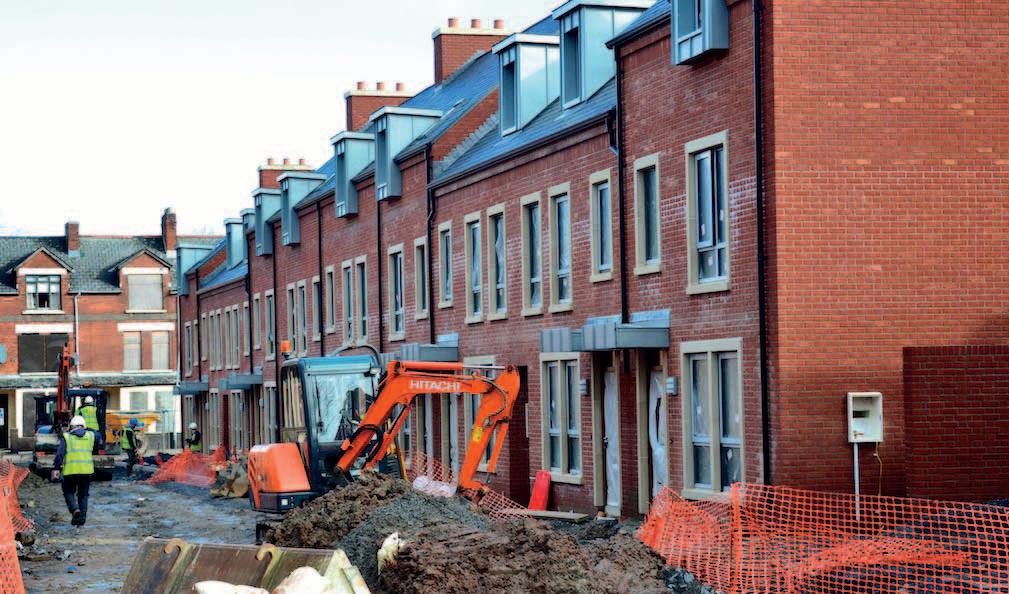

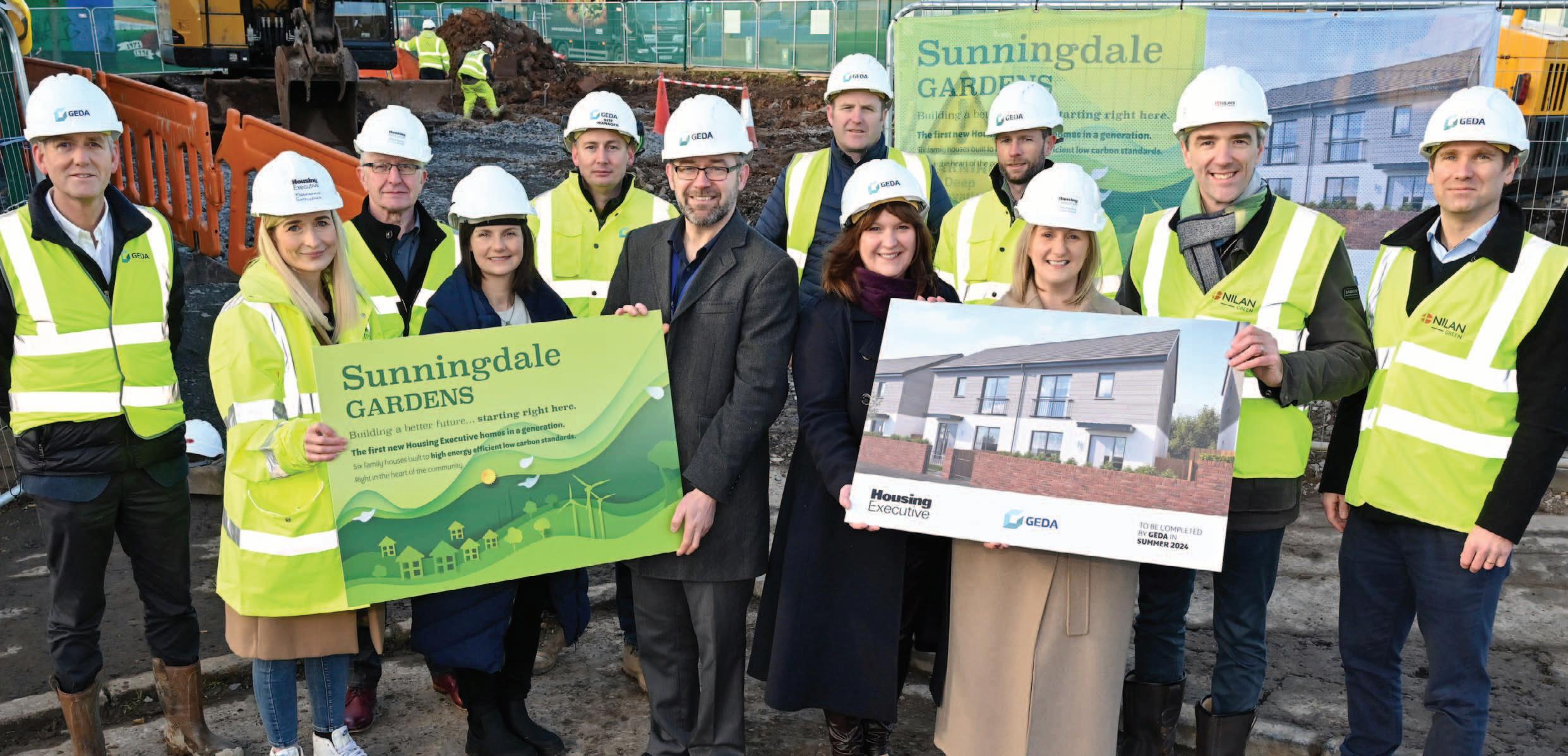
As global temperatures continue to cause grave concern, Northern Ireland is witnessing a stepchange in the delivery of decarbonised, future proofed housing. Grainia Long, Chief Executive of the Housing Executive, makes the case for purposeful, strategic intent on the path to net zero, and climate-resilient homes.
In February 2024, the European Union’s climate service confirmed our global climate breached 1.50C above preindustrial levels for an entire year for the first time in history. Since June 2023, we have witnessed monthly record temperature breaches, with February itself clocking in at 1.770C above the norm.
According to the United Nations, levels of carbon dioxide concentrated in our atmosphere are at the highest level for at least two million years and human activity is the key factor.
The impact of climate change is being felt globally, and locally. Our tenants and our communities require us to ensure they are protected from the worst effects, but also to ensure that rapid

decarbonisation becomes the norm, both in terms of how we build our homes, and how we heat them.
The Housing Executive’s (NIHE) Sustainable Development Strategy is the critical document driving the pace and scale of change across the strategic housing authority, which is also the largest public landlord on these islands. The action-oriented plan is approaching its midway point, so now is a good time to reflect on how this is being delivered.
The Sustainable Development Strategy and Action Plan is grounded in the UN’s Sustainable Development Goals, and sets clear targets for greenhouse gas
reduction, and commits the organisation to a singular focus on adaptation. It focuses on the key impact areas of the built environment, the biosphere, sustainable communities and transport, as well as the need for educational empowerment, and improved health and wellbeing through sustainable living.
A key pillar of the strategy is that a ‘just transition’ is essential – the energy transition must not deepen pre-existing social inequalities.
As soon as the strategy was launched, we ensured the people, time and financial resources necessary were put in place to deliver on our ambitions.
To date we have:
• trained 1,650 staff in carbon literacy, more than half of all NIHE staff;
• grown demand for our NI Energy Advice Service, answering more than 15,000 queries in the past year;
• launched a new energy savings calculator, available to everyone to give them an overview of the interventions they can make to their home to reduce the cost of energy;
• planted over 11,000 trees during

the 2022/23 planting season, exceeding our target of 7,000;
• completed a major programme of 1,400 retrofits, the largest social housing programme of its kind in Northern Ireland;
• gone beyond our fabric-first retrofit, and commenced a 300-home low carbon energy retrofit programme, putting ultra-low carbon heating systems into our stock for the first time;
• commenced a landmark new-build pilot, building social housing to Passive House standard using modern methods of construction, another first for Northern Ireland;
• allocated a £200,000 budget for social enterprise grants in 2023/24;
• begun the decarbonisation of our fleet; by introducing 10 electric vehicles in the past year; and
• commenced development of an organisation-wide climate adaptation plan, which is on course to complete this year.
Our action plan will continue to drive our efforts to ensure that everyone is able to live in an affordable, sustainable and decent home, appropriate to their needs, in a safe and climate-resilient place.
For the first time in a generation, the Housing Executive is building homes again.
As I write, a pilot project in the Sunningdale area of north Belfast is delivering six, low carbon, new-build homes to Passive House standard.
Working with construction company, GEDA, we are building future-proofed homes that will be constructed to a standard beyond that of current building regulations in Northern Ireland.
The ultra-low energy building methods being used to construct these houses will mean that our tenants benefit from improved energy efficiency and a reduction in carbon emissions, savings from reduced fuel costs and more comfortable homes.
This scheme will help us to investigate how modern methods of construction can be utilised to deliver much needed homes within a faster timeframe, to a higher level of fabric performance, and
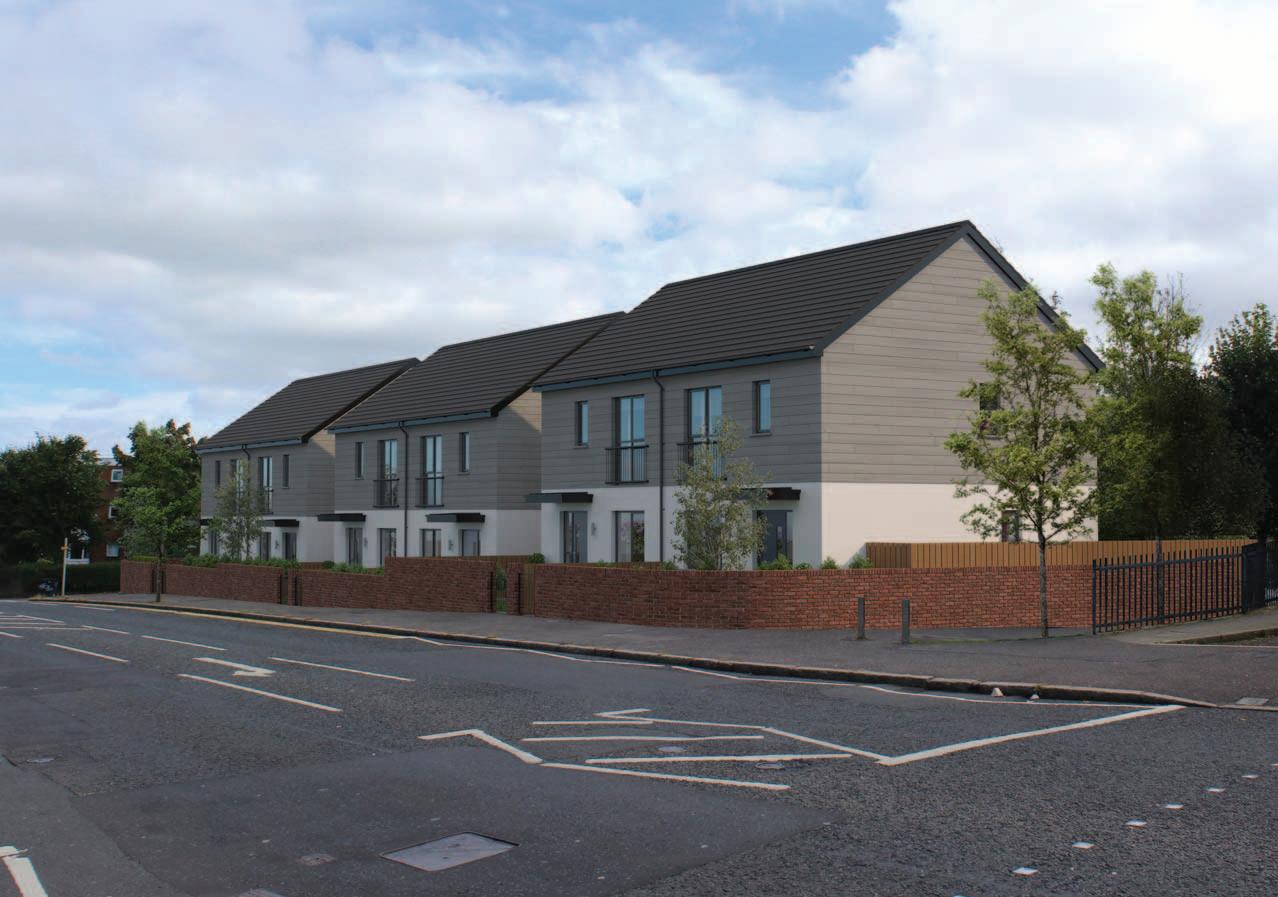
explore ways to drive down costs, in comparison with traditional construction methods.
Alongside our housing association partners, we are witnessing a step change in housing delivery, where developments at scale will provide suitable, future-proofed properties built to last beyond this century.
While new build is critical to ensuring decarbonised stock, the bulk of our focus must be on our existing stock.
We recently completed the Energy Efficiency in Social Housing project, funded jointly by the European Regional Development Fund (ERDF) and NIHE reserves. More than 1,400 properties across Northern Ireland benefited from works to improve the energy efficiency of their homes, assisting tenants in managing the cost of living and reducing carbon emissions from our stock. Taking a fabric first approach to non-traditional housing stock, the work included a variation of: external wall insulation; window/door replacements; cladding and roofing work; roof and floor insulation; and providing ventilation to kitchens and bathrooms, where required.
The programme enabled us to select the right method of retrofit for our particular construction type. But importantly, it also enabled us to consider procurement techniques, contract management approaches, and the skills development needed to scale up retrofit in social housing stock in Northern Ireland. The pilot has been transformational for
us as an organisation; building our capacity to ramp up retrofit across our housing stock. But most importantly, for those tenants living in newly refurbished homes, it has made a hugely positive impact on their lives.
While our 1,400 home retrofit programme gave us the experience we needed to understand a fabric first approach to retrofit, it is crucial that we also understand the performance effects of placing low-carbon heating systems into energy efficient homes. To understand this more fully, we have recently launched our 300 Low Carbon Energy Retrofit Programme.
This programme will see the implementation of low carbon retrofits to 300 homes by March 2025.
Phase One will include upgrades to 98 homes in the Strabane, Dunmurry, and Newtownards areas. Phase Two will include homes in Sion Mills, Dungannon, Antrim, Newtownards, and Dunmurry. This programme amounts to an investment of £9 million by the Housing Executive.
It will follow a whole house approach to reducing carbon emissions and householder bills, providing homes that promote health, through a combination of the following interventions:
• improved energy efficiency measures through retrofitting;
• low carbon heating options, principally air source heat pumps (ASHP), with options for biomethane and hybrid;
• improved ‘time of use’ electricity tariff options;
• improved householder education to effect behaviour change; and
• renewable energy for power generation and electric storage.
Based on our previous experience we know that retrofit programmes of this nature work best when we implement them in partnership with our tenants. To ensure our tenants get the maximum benefit from upgrades we carry out education and familiarisation visits to enhance and encourage best use of the energy efficient measures.
While a focus on our housing stock is central to reducing our carbon emissions, improving the lives of our tenants is always our ultimate goal.
As a responsible landlord we are committed to bringing our tenants along with us on the journey to net zero. With cost-of-living pressures and an increased awareness of energy efficiency we want to ensure that our tenants are supported to make changes and benefit from help on offer.
There are a number of support services available:
NI Energy Advice offers free independent and impartial energy advice to domestic householders in Northern Ireland, including advice about energy grants and other sources of help.
Funded by the Housing Executive, the service is a one-stop shop for energy advice, providing information to help with energy efficiency grant signposting, renewable energy advice, energy saving tips, how to switch energy provider, debt assistance, fuel poverty advice signposting and how to benefit from oilbuying savings across Northern Ireland.
End-to-end delivery of the Affordable Warmth Scheme transferred to the Housing Executive in September 2023.
Delivered on behalf of the Department for Communities, it is designed to help those on lower incomes, and who are living in private accommodation, with the costs of energy efficiency measures.
Funding for the scheme has been extended so that it will continue until March 2026.
Customers may be entitled to help under the scheme if they:
1. own their own home and occupy it as their sole or main residence, or rent from a private sector landlord; and
2. have a total gross annual household income of less than £23,000.
Applications to the scheme can be made through the Northern Ireland Energy Advice Service.
Our Home Energy Saving Tool was launched in November 2023.
The return of the Northern Ireland Executive provides an immense opportunity to launch a strategic approach to green growth, to deliver on the Northern Ireland Energy Strategy, and to ensure a robust path to decarbonisation of our residential housing stock. It provides new impetus to revise building regulations, to build partnerships with industry, to invest in research and innovation and to ensure a just transition for communities. It is a hugely optimistic time to be working in the build environment.
Much work is needed to ensure that the targets we have set are robust, and that the pathways we are choosing are realistic. Building our delivery capacity is critical which is why the NIHE has chosen to deliver a number of pilots at scale to ensure we have the funding models, procurement strategies and delivery frameworks in place before we scale up.
As government looks to the future, strategic intent is crucial to ensure that investors, industry, and consumers understand Northern Ireland’s path to decarbonisation, so that we can all work together in the best interests of our communities.
Once the right strategy and purpose is in place, organisations like the Northern Ireland Housing Executive are ready to deliver at scale.
Housing Executive
T: 03448 920 900
E: information@nihe.gov.uk W: www.nihe.gov.uk

It can help householders to lower their energy bills and make their homes more comfortable. By answering a few basic questions about their home, householders can find out how energy efficient their home is and what changes they could make for further efficiency.
The tool will create an action plan to outline potential steps to improve energy efficiency.
Developed in partnership with the Energy Saving Trust, the tool is available to everyone on the Housing Executive website.
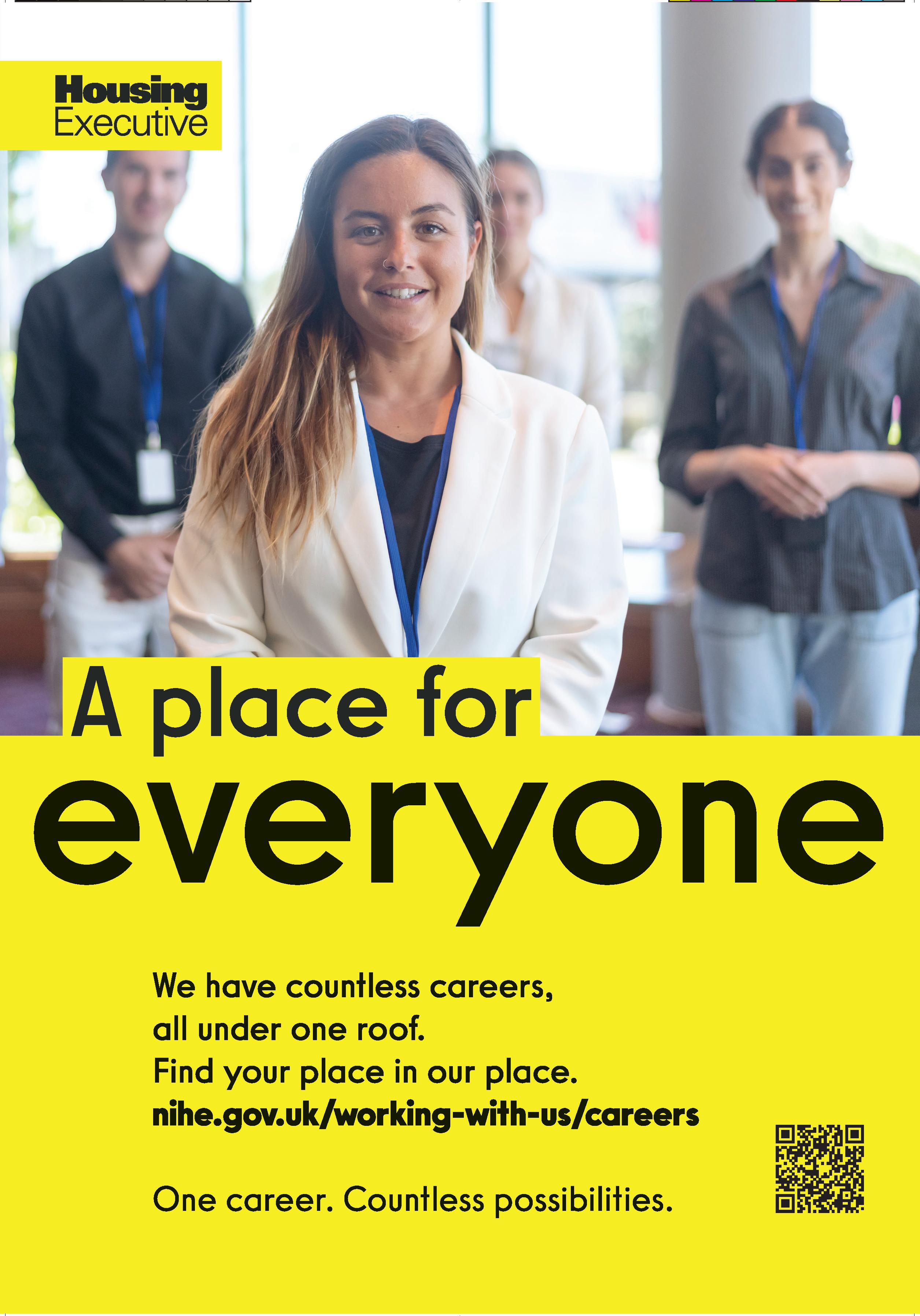


Dara Turnbull, research coordinator at Housing Europe, compares the housing context in Ireland with exemplar EU member states.
Speaking on behalf of Housing Europe, the European federation of public, cooperative, and social housing, Turnbull unpacks Delivering on housing in Ireland: A European policy perspective. Commissioned by the European Parliament’s Renew Europe group, the report examines the context of the Republic’s housing sector relative to other European states and offers potential solutions for decisionmakers.
Ireland’s housing crisis has several elements, but the most consistent theme is that the cost of housing is outweighing wage growth, thereby making home ownership and rents inaccessible or unaffordable for many Irish residents.
For prospective homeowners, for example, statistics from the Central
Statistics Office (CSO) and the Republic’s Department of Housing, Local Government and Heritage, show that the average house price increased from €40,283 in 1990 to €311,514 in 2022, a growth of almost a factor of seven or a 673 per cent increase.
Meanwhile, the average annual earnings in the Republic in the same period grew from €25,811 to €66,914, a 159 per cent increase. This disparity between wage growth and house prices has meant that, whereas in 1990 the average house price was around 56 per cent higher than annual earnings, house prices are now around 4.65 times greater than annual earnings.
Housing Europe’s report determines that Rebuilding Ireland, the Irish Government’s previous housing
strategy, had a goal of building 25,000 new homes per year, but that “actual output was only around 76 per cent of that”.
Although the housing crisis is being exacerbated by undersupply, delving into these building statistics, Turnbull asserts that the area of most significant underdelivery was primarily in private sector construction.
“A relative overdelivery by the public sector has helped to compensate for an underdelivery by the private sector,” he says.
“Government needs to be more aware of the direct policy levers that it has over public housing policy versus demand side incentives and schemes which are not necessarily leading to delivery of infrastructure.”
Examining Ireland’s housing market compared to those of Austria, Denmark, and the Netherlands on housing affordability specifically, Turnbull explains that in Ireland in 2022, around 9 per cent of the total housing stock was classified as social and affordable housing. This figure is significantly below figures of 24 per cent in Austria, around 20 per cent in Denmark, and just under 30 per cent in the Netherlands.
Comparing Dublin with the exemplar state’s capital cities, Turnbull states that the “disparity is even greater”. Around 11.3 per cent of Dublin’s housing stock is classified as being “social or affordable”, while this figure surpasses 40 per cent in Amsterdam and Vienna.
The Housing Europe research coordinator explains that this disparity may well be down to the European practice known as ‘build and retain’.
“They build social housing and the objective is to retain the system in perpetuity,” he outlines.
Contrasting this model with Ireland, Turnbull states: “The majority of publicly supported and publicly built housing that we have constructed in the State since the 1930s is now privately owned. We have been very good at building public housing in this State, but we have not been very good at holding onto it, so that is a missed opportunity.”
To meet the challenge of under delivery by the private sector in housing supply, Turnbull cites a cooperative model utilised in Sweden which could be adapted for the Irish market.
Essentially based on what Turnbull describes as a ‘cost purchase’ principle, the Swedish model is backed up by a national cooperative housing guarantee fund, which enables newly forming local housing cooperatives to unlock the necessary construction loans from commercial banks, which would otherwise not be possible given a lack of collateral to ‘back up’ such lending.
“A local housing cooperative can come together and pool their resources to build new housing. When the development loan is repaid, that lending
is refinanced as standard mortgage lending,” Turnbull explains.
As a result, around one in four Swedish primary residences are part of the cooperative housing sector.
In 2023, the Irish Government met its overall housebuilding target under its Housing for All policy of constructing 30,000 homes, and Minister for Housing Darragh O’Brien TD has expressed his confidence that a similar number will be achieved in 2024.
Turnbull warns of a potential “dark cloud” for construction, as the raising of interest rates by the European Central Bank may prevent private construction from playing an optimal role in house building due to prospective inadequate yields.
As interest rates are likely to reduce through the course of 2024 as inflation is projected to decline, there may be long-term optimism that supply will increase in the Irish housing sector which is the ultimate key to solving the state’s housing crisis.
However, Turnbull states that even if interest rates do decline towards the end of 2024, or in early 2025, they will nevertheless be much higher than in the
Dara Turnbullpreceding decade. Thus, other investment will remain more attractive, meaning real-estate will not be as attractive as prior to the ongoing inflation crisis.
He continues: “Given strong protections for tenants, which are completely justified, the long-term return on things like build-to-rent are not as attractive as in the past, when there was effectively no clear limit to potential returns. As a result, the capital value of BTR apartments is today, and will remain in the future, below the actual cost of construction. This effectively means that such projects are not viable.
“Even if interest rates decline, it does not suddenly mean that residential construction kicks back into gear. I think the dark clouds over the sector will not lift so easily. Having said that, it seems that in the Republic, large Approved Housing Bodies have become important purchases of residential developments that had originally been earmarked for large corporate investors.
“The State may be able to pick up some of the development already in the pipeline, but it is not clear how this pans out over the longer term,” he concludes.
Dara Turnbull is the research coordinator at Housing Europe – The European federation of public, cooperative, and social housing, where he has worked since 2019. He is responsible for managing various research projects, and working to promote the uptake of new approaches and best practices by housing providers.


The Chair of Woven Housing Association (formerly Habinteg), Neil McIvor, discusses the urgent need to deliver more homes across Northern Ireland and the challenges which stand in the way.
Northern Ireland is in the midst of a housing crisis. Over the past decade, the social housing waiting list has been growing, outstripping the supply of available housing. Today, there are almost 50,000 people waiting for suitable accommodation. There has been a significant rise in the number of households with homelessness status and the need for temporary accommodation is increasing every month.
In 2023, the number of new homes completed locally fell to its lowest level in more than 64 years causing a housing supply crisis.
To address this problem there is an urgent need to deliver more homes across Northern Ireland in both the private and social sectors. Housing
associations, however, face many challenges in meeting this need.
Over the past two years, increased construction and running costs, borrowing costs and pressures on rent levels all played a part and threatened the viability of continued growth which is a massive strategic issue for all associations.
The financial capacity of associations to deal with a range of adverse scenarios, even with grant funding, is hugely impacted by factors such as rising costs, inflation, and cost of living pressures for our tenants.
As an association, Woven is working hard to keep rent levels affordable but with rising costs across all aspects of delivery and funding limitations this is challenging.
The proposed cuts to Northern Ireland’s capital budget are alarming and threaten to further reduce the supply of much needed social housing at a time when demand has reached an unprecedented high. Investment in social housing positively impacts the local economy through job creation and supply chain benefits, in addition to significant human and community benefits. Having a home is the basis for happier, healthier and more positive lives.
Furthermore, budgetary pressures on funding streams such as Supporting People have impacted on the development and delivery of adequate supported housing solutions. At Woven, we are committed to providing residents with independence, whilst having access to some on-site support services to enhance their living experience.

Statutory approvals including planning permission is a laborious and lengthy process which is impeding housing supply. Challenges around sewage infrastructure and wastewater capacity are also having a detrimental impact.
Section 76 (planning gain), however, has been a welcome addition, ensuring that house builders and developers provide a certain amount of affordable housing in larger schemes.
Unfortunately, these homes are also impacted by statutory approval delays. A priority for the Executive must be to streamline the process and timescales which are holding all housing developers back.
Unfortunately, there is much stigma around social housing with many still believing that the sector attracts high levels of antisocial behaviour and settlement issues.
In particular, one-bedroom properties and apartment developments struggle with negative perceptions, but these are one of the most needed property mix on the waiting list. Demographics are changing; we have an ageing population and more singles with no dependants who need homes.
By developing more one-bedroom homes, associations can accommodate tenants who are ready to downsize. This frees up larger properties for larger families on the list, helping meet unmet needs.
Due to social and affordable policies coming into councils such as Belfast City Council, and Lisburn and Castlereagh City Council there has been a shift towards encouraging mixed tenure and mixed-use developments.
Mixed tenure developments will not fix the housing crisis alone, but they will encourage more development opportunities that foster a greater social, economic and community mix. This will support thriving and sustainable
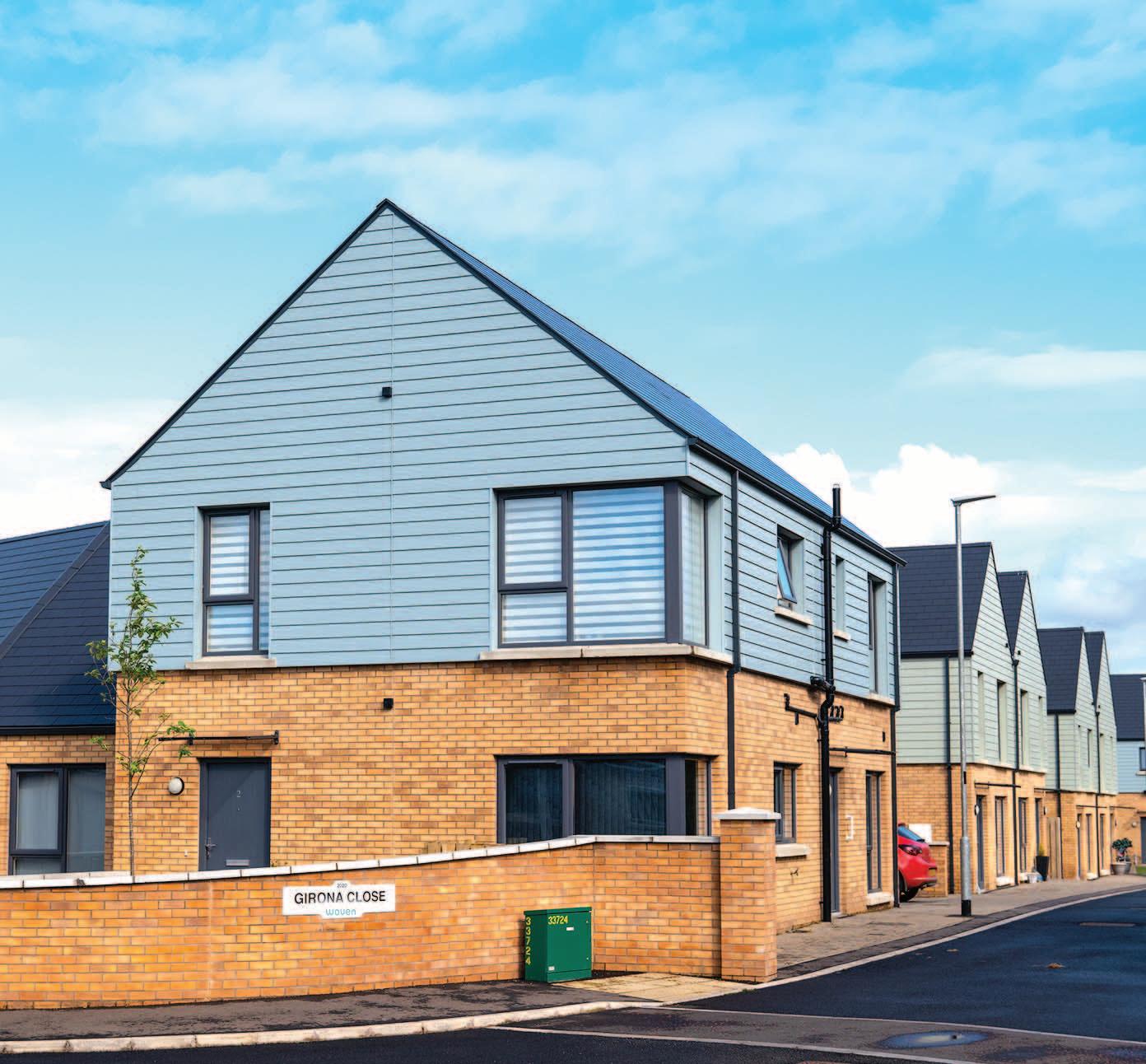
communities and help break down unfounded perceptions of social housing.
In addition to developing more homes, Woven are committed to investing in refurbishing existing homes to meet and exceed the current standards and tenant expectations, while achieving government sustainability standards. Committed to achieving net zero through energy efficiency and sustainable development, these refurbishments allow Woven to reduce running costs for tenants which is critical given the costof-living crisis.
Following Woven’s rebrand this year, we have committed to investing over £150 million in new developments, stock upgrades, and enhanced housing services over the next five years.
Currently, Woven provides over 2,500 homes across a range of housing solutions including supported, sheltered, and general needs housing. We are committed to working in collaboration with our partners to explore mixed tenure and mixed-use developments, which offer a sense of place where communities can be woven together as one and provide opportunities for residents to live and work within a
vibrant and integrated environment. Current pressures on the local housing system cannot continue and there will be substantial adverse consequences for individuals, families, and society if additional funding and reform are not prioritised. With the Northern Ireland Assembly back up and running, we look forward to working with MLAs and other housing associations to implement positive changes across the sector.
We welcome the opportunity to discuss new partnerships and opportunities to meet housing need. If you would like more information, please email info@woven.org.uk
Neil McIvor, Chairman of the Board at Woven Housing Association
T: 028 9042 7211 E: info@woven.org.uk


be approved “fairly quickly”


A long-term strategy to relieve housing stress in Northern Ireland which narrowly missed out on Executive approval, remains in “good shape” and could be approved quickly, MLAs have been told.
Answering questions before the Northern Ireland Assembly’s Committee for Communities, the Department’s senior official with responsibility for housing, Mark O’Donnell, said that while he did not want to be over confident, he believed that the draft Housing Supply Strategy, initially due to be published in March 2022, could be taken to the Executive “fairly quickly”.
Preparatory work for the Strategy, which plans to deliver over 100,000 new homes by 2037, began back in 2020. Initially delayed due to the Covid-19 pandemic, finalisation of the draft strategy coincided with the collapse of the Stormont institutions,
meaning it has yet to receive Executive approval.
Within the 100,000 home target at least a third are set to be social homes, prompting calls for the strategy to be prioritised by the Executive amid rising levels of housing stress in Northern Ireland.
At the end of 2023, there were 46,461 applicants on the social housing waiting list, 34,651 of whom are deemed in housing stress, a 7 per cent increase on Q4 2022. Increasing the social housing stock is recognised as a critical part of addressing this challenge.
If agreed by the Executive, the new
Housing Supply Strategy would require delivery of an estimated 2,222 new social housing units per year.
Currently, recent social housing targets set by the Department for Communities average below 2,000 units per year.
The Social Housing Development Programme set a target of delivery of 1,950 social housing starts, and 1,400 social housing completions for the 2022/23 year.
Recently released figures show that housing associations narrowly exceeded those targets, completing 1,449 homes across 82 schemes, while starting work on 1,956 new homes. However, targets for the current

2023/24 year have been reduced.
Despite exceeding targets, housing associations have warned that reductions in the capital budget allocated by the Department, in an annual budget format, alongside rising costs, could severely reduce delivery in the coming years.
The most recent annual budget, set by the Secretary of State in the absence of a functioning Executive, the Department recognised a 27 per cent shortfall in capital required for 2023/24.
O’Donnell, the Deputy Secretary of Housing and Sustainability, attended the Communities committee alongside Permanent Secretary for the Department, Colum Boyle. In an opening address to committee members, Boyle laid out the “incredibly challenging” budgetary position for the Department in recent years, but stressed that housing was a main priority for the new Minister Gordon Lyons MLA.
One potential sticking point is that the Housing Supply Strategy was drafted on the assumption that the Executive would publish and operate a multi-year budget. Although such a budget is likely to be an ambition of the restored Executive, a squeeze on public finances raises doubts over whether ambitions of the strategy will be fully funded.
The draft Housing Supply Strategy sets out a vision that “everybody has access to a good quality, affordable and sustainable home that is appropriate for their needs and is located within a thriving and inclusive community”, acknowledging that the adoption of a whole-system approach can ensure inclusive transformation of supply.
Rising levels of homelessness, coupled with a social housing waiting list in excess of 45,000, the vast majority of which are in housing stress, has been compounded by inflationary pressures on supply, rising rents, and an acknowledgement that current housing stock is not reflective of the changing needs of the population.
Social Housing Development Programme (SHDP) New Social Housing Dwelling Completions 2010/11 –Q3 2023/24
2010/112011/122012/132013/142014/152015/162016/172017/182018/192019/202020/212021/222022/23Q32023
The draft Housing Supply Strategy is centred on five key objectives:
1. Creating affordable options: Increase supply across all tenures and establish new intermediate products;
2. Prevention and intervention: Developing a holistic approach to housing provision, including wraparound and support services;
3. Quality: A comprehensive review of fitness standards;
4. Better places: New approaches to place-making; and
5. Decarbonisation: Working with housing providers to ensure new build homes are net zero carbon by 2026/27.
The return of the Executive has reenergised calls for inclusion of a standalone strategic housing outcome in any future Programme for Government. The New Decade, New Approach deal to restore power sharing in 2020 included a pledge to include housing as a specific priority in the Programme for Government (PfG), however, no such PfG was developed prior to the subsequent collapse.
At the end of February 2024, new First Minister Michelle O’Neill and deputy First Minister Emma Little-Pengelly MLA told the Executive Office Committee that the Executive was focused on bringing forward a PfG “as soon as possible”.
Undoubtedly, a critical element of an increase in Northern Ireland’s social housing supply will be progression of plans to revitalise the Housing Executive, including the reduction of prohibitive barriers for the organisation to borrow, and therefore build new social homes.
Speaking in late February 2024, O’Donnell said that officials in the Department were set to meet with the Minister to discuss “the pressing need” to address the huge levels of investment needed in the Housing Executive’s some 82,000 stock.
He added that discussions with the UK Treasury are ongoing around the budgeting treatment of the Housing Executive’s borrowing and the impact on public finances.
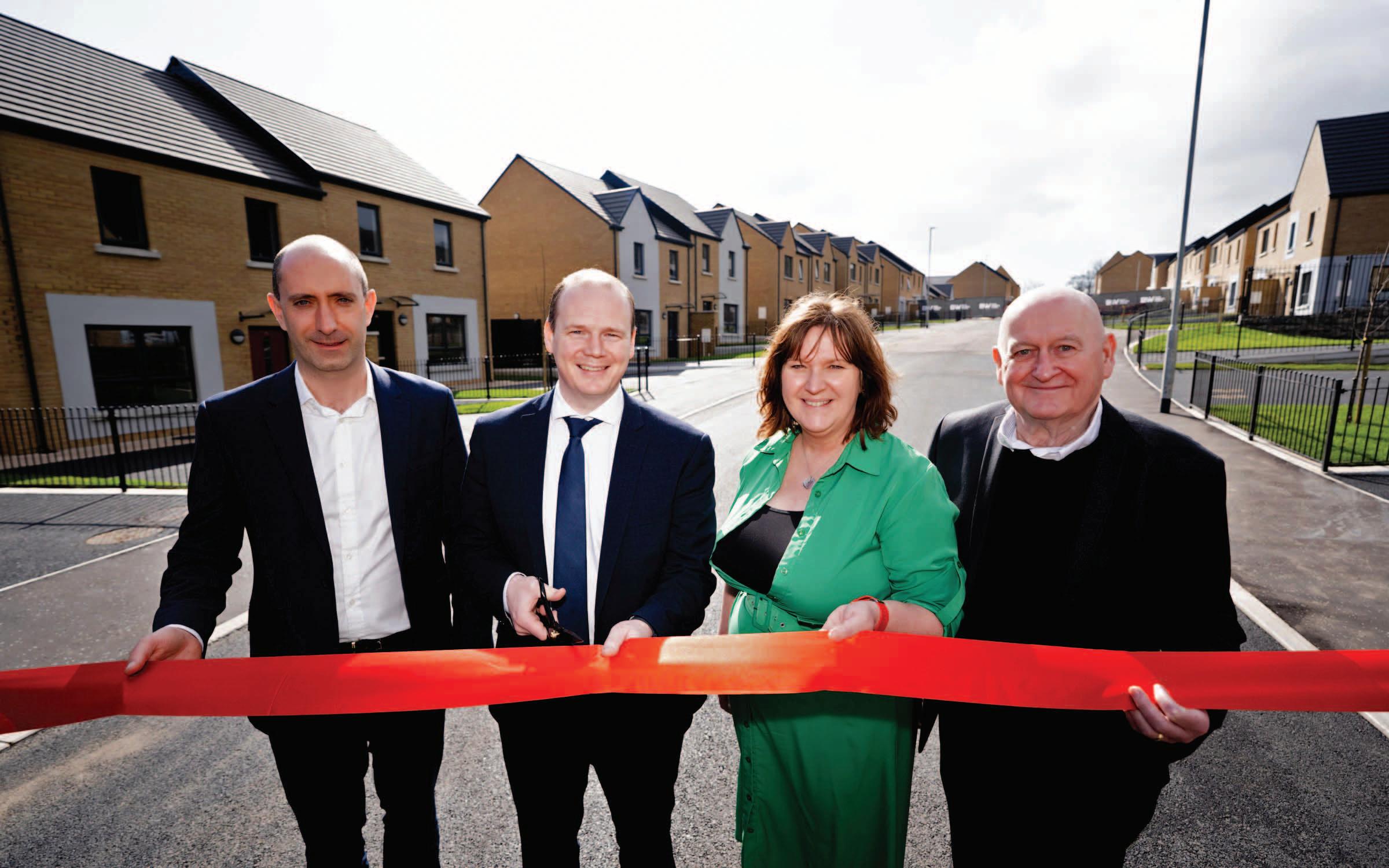
The largest housing development currently under construction in Northern Ireland has been officially opened by Communities Minister, Gordon Lyons MLA.
The Black Ridge development in west Belfast will see Apex Housing Association (Apex) provide 653 new homes, including 549 social homes to rent and 104 affordable homes for sale. Constructed by the Braidwater Group, the keys to 50 of these new homes have been handed over in recent weeks to the first residents of Black Ridge, with the entire development expected to be completed by 2028.
The £102 million scheme has been supported by £52.4 million Housing Association Grant funding from the Department for Communities and £49.4 million private finance investment by Apex. The development will also feature a community hub with MUGA (multi-use games area), two care homes, a neighbourhood retail centre, a hotel, and a number of children’s playparks.
Speaking at the opening event,
Communities Minister Gordon Lyons, commented: “As Minister, I am pleased to be opening this transformational project. Landmark developments such as Black Ridge are a significant step in addressing the housing need which exists in this community. Everyone has a right to a decent standard of housing. And yet, a home is much more than bricks and mortar. It begins with a roof over someone’s head. But it extends far beyond that, into a collaborative effort which supports individuals and families.
“We recognise that houses can be designed and built, but communities are developed and nurtured. I commend Apex Housing Association, and indeed all those involved, and wish the residents every happiness in their new homes.”
One of the first residents to move into
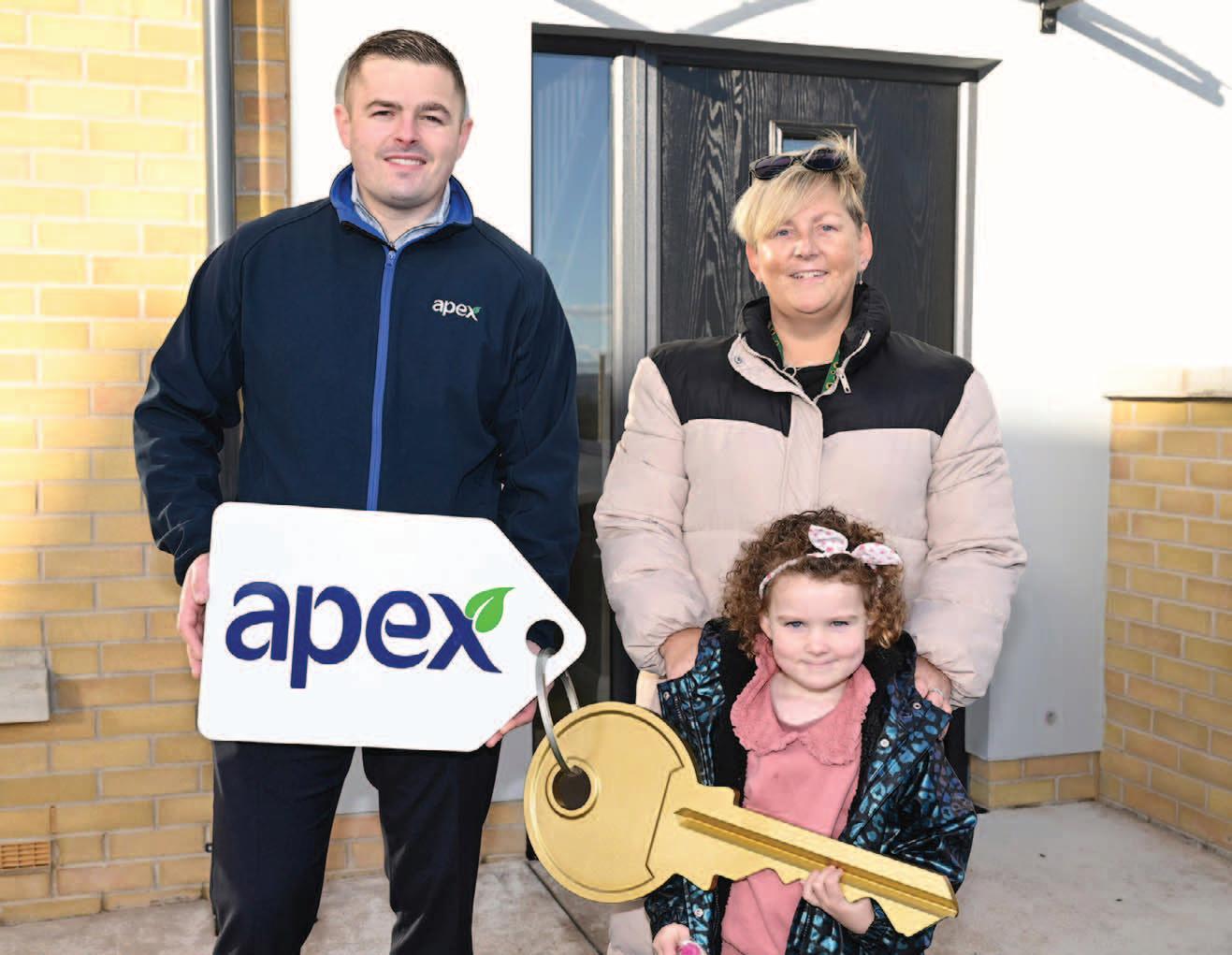
her new home at Black Ridge was Nicola Marshall. Nicola and her family waited two decades for a suitable home in the area and were delighted to be offered their new house in Black Ridge View: “It has made a big impact on us as a family. After renting privately for 20 years, it is great to know that this house is all ours. As a mummy, it has taken a weight off my shoulders knowing that my kids now have their family home.
“It is close to the shops, my daughter Fiadh’s school; and near our family, who all live in and around the Andersonstown area. We are really excited to be in the middle of a growing community which will see lots of families living together, with a sports hub, hotel and playparks all on our doorstep.”
Peter Caldwell, Chairperson of Apex Housing Association, says: “We are delighted to mark the official opening of Black Ridge and to recognise the impact that these new homes will have on local people and families. The scale of this development means it will continue to play a significant role in addressing the demand for social and affordable housing in west Belfast. We look forward to seeing this new community grow and develop in the coming years.”
Housing Executive Chair, Nicole Lappin, says: “Congratulations to Apex Housing and all the other partners involved in delivering these new properties at Black Ridge in west Belfast. Social housing developments of this nature, funded by grant from the Department for Communities and the Housing Executive, are crucial to tackling current waiting lists across Northern Ireland. Fifty families are already enjoying their new homes at this site and I very much look forward to witnessing further allocations to hundreds of households in the weeks and months ahead.”
Joe McGinnis, Managing Director of the Braidwater Group, comments: “Having started onsite in 2021 and recently handed over the first of the 653 homes, the Braidwater Group is delighted to be involved in a significant milestone and the official launch of Glenmona, or Black Ridge as it will be known going forward. It was our pleasure to welcome Minister for Communities, Gordon Lyons, to officially open Black Ridge and we thank all of our partners involved in ensuring the development matures and helps alleviate the significant housing demand for the area.”
“The scale of this development means it will continue to play a significant role in addressing the demand for social and affordable housing in west Belfast.”
Peter Caldwell, Chairperson of Apex Housing Association
Construction began on the Black Ridge development in March 2021, with the first homes completed in late 2023. ‘Black Ridge’ was chosen as the street name of the development with the help of pupils from St Teresa’s Primary School, which is located next to the development.
For more information about the Black Ridge development, please contact:
Apex Housing Association 10 Butcher Street
Derry~Londonderry BT48 6HL T: 028 7130 4800 W: www.apex.org.uk

paused’
The development of an overdue strategy aimed at linking social landlords with tenants to improve services has been “formally paused” due to a lack of resources.
The Tenant Participation Strategy, which previously ran from 2015 to 2020, has not been renewed and it now seems unlikely that the Department for Communities will publish an updated strategy unless additional resources are allocated.
Originally published in 2016, A Tenant Participation Strategy for Northern Ireland: 2015-2020 sets out a framework for the introduction of tenant participation services within Northern Ireland’s social housing sector.
The Housing Executive and various housing associations act as Northern Ireland’s social landlords, and the previous strategy recognised inconsistencies in the approach to tenant-focused services across housing associations, with an acknowledgement that tenant engagement works best when government provides leadership and support.
Among the main achievements of the original strategy and subsequent action plan was the founding of an Independent Tenant Organisation (ITO), the establishment of a Housing Policy Panel, and the introduction of a Tenant Advocate Role.
Importantly, the strategy mandated all social housing providers to develop and put in place their own tenant participation strategies.
It was envisaged that a review at the end of the strategy would identify any improvements that should be included in a successor strategy. However, work on the strategy has been stalled and no timeline has been set for work to resume, even after the return of the Executive.
Speaking before the Northern Ireland Assembly’s Communities Committee, the Department’s Rent Project Manager Heloise Brown said that following a resource review, work on the Tenant Participation Strategy is now “formally paused”.
Outlining that the policy teams within the department were now focused on areas including developing the ‘decent home standard’, the review of regulatory policy and affordable rent for social homes, Brown indicated that Tenant Participation Strategy work had been “paused”.
However, she stressed that engagement between the Department and housing associations continues, adding that the Department was still “very confident” that the various housing associations have their strategies in place for tenant participation.
In response to a question by the Committee’s vice chair, Ciara Ferguson MLA on whether a timeline had been established for the development of a strategy, Deputy Secretary of the
Housing and Sustainability in the Department, Mark O’Donnell, stressed the resource pressures his department is facing, including some 600 vacancies.
“Unfortunately, there are things that we are not able to take forward and the development of the new tenant participation strategy is one of them,” he stated.
Ferguson has since described the decision to pause work in this area as “disappointing”.
“The Tenant Participation Strategy is important because it gives people living in social housing input on the quality of their home,” she says.
“Previously we have seen issues caused by sub-standard social housing, such as extensive mould in homes, and the negative impact that has on people’s health.
“This underlines the importance of maintaining and improving social housing and the voice of residents is an important part of that conversation. Talking and listening to social housing tenants on an ongoing basis is something that the Department and the Housing Executive must do going forward.
“I will continue to raise this directly with the Minister and his department,” she concludes.



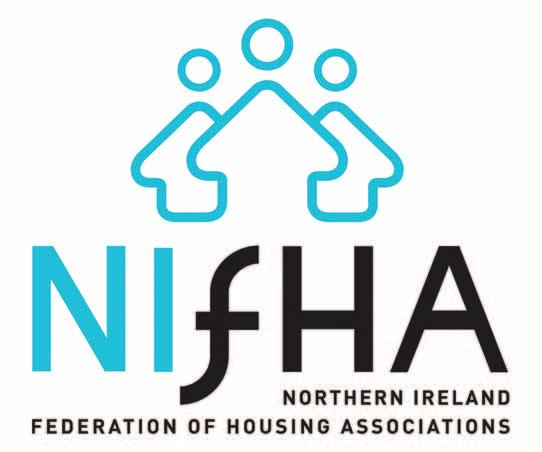
A new Northern Ireland Executive means a new opportunity to proactively address the challenges we face as a society, and when it comes to housing, Northern Ireland’s record is on very shaky foundations, writes Seamus Leheny, Chief Executive of the Northern Ireland Federation of Housing Associations.
In 2022/23 housing associations exceeded new build completion targets set by the Department for Communities of 1,400 by delivering 1,449 despite facing considerable challenges including record levels of inflation. Housing associations brought the total number of homes managed by the 20 associations in Northern Ireland to more than 59,000 in that period and will surpass the 60,000 milestone mark by year end 2023/24.
But it is well short of the number of homes needed, and in 2023/24 a budget cut of 14 per cent has seen the new build targets from the Department reduced significantly – down from 1,950 to less than 1,500.
The sharp rise in material and energy costs in recent years has seen construction costs soar. It is not just stadiums like Casement Park and multimillion pound infrastructure projects which are impacted by this, but social housing providers have also felt the pinch.

real terms, that only means fewer building sites, fewer jobs for construction workers, and fewer social houses built. While some housing associations are able to raise significant finance in the private market, this is not a long-term solution to the lack of prioritisation of social housing within the wider Northern Ireland Executive budget.

With half the funding for social housing construction coming from the public sector, and these budgets declining in
Even with finance secure, the process of securing planning permission is unnecessarily bureaucratic and plagued with delays, including those from statutory consultees. Belfast’s new Local Development Plan – which requires all developments over 10 units to include 20 per cent social housing – is welcome, but its implementation is in the very early phase and it is too early to reach a verdict.
Further problems then arise when trying to connect to the water and wastewater infrastructure, where NI Water says it does not have the capacity to connect new projects in many areas.
With a new Northern Ireland Executive in place, when we pose the question ‘do we really recognise the importance of housing’? What is the answer?
Along with our sector colleagues, I wrote to the new First and deputy First Ministers, asking them that housing be properly recognised by including it as a standalone outcome in the Programme for Government. What that would mean is that housing would be considered as one of the most fundamental and important elements of our society. It would see that government departments working together to improve housing stock and new build, as it will have positive, knock on impacts across several parts of society including health and education.
Taking a strong approach to housing policy and investment will therefore deliver positive economic and social outcomes to the benefit of everyone.
The Northern Ireland Executive putting housing on a firm footing – with a concrete pledge in the Programme for Government – would be a great step to recognising the importance of housing.
T: 028 9023 0446
E: sleheny@nifha.org
W: www.NIFHA.org



Labour shortages in the construction sector are posing key challenges to supply in all housing markets in Ireland and Britain, research has found.
In an extensive report analysing the Irish – north and south – Welsh, Scottish, and English residential markets, with a particular focus on their capacity to increase housing supply over the short to medium term, the Economic and Social Research Institute (ESRI) highlights a need for changes to traditional recruitment methods.
Suggesting adaptations that include hiring trainees and apprenticeships to allow young workers to learn on the job, alongside attracting skilled workers who have left the industry to return, the research highlights that while the challenge exists across all markets, the situation is particularly acute for the Northern Ireland and British markets, where Brexit has made net immigration into the UK more difficult.
“Traditionally over the past 25 years, housing markets in Ireland and the UK have sourced a significant amount of
labour from the European Union. By definition, this is now more difficult for the UK and the Northern Ireland markets,” it states.
Brexit has also had an impact on the ‘hard costs’ experienced by individual housing markets. While the Republic of Ireland has in recent years experienced higher materials and labour costs than housing markets in Britain, the rate of growth in costs in those markets has been faster, exacerbated by Brexit.
“This is putting further upward pressure on wages and prices of materials, on top of international trends generally,” the report states.
However, it is noted that Northern Ireland’s housing market has been somewhat shielded from Brexit-related cost increases in relation to materials, due to the arrangements of the Windsor Framework. This is not the case when it comes to wages, with Northern Ireland seeing the fastest rate of wage increases compared to the
Republic of Ireland and the rest of the UK.
Contrasting housing supply in the Republic of Ireland, Northern Ireland and the rest of the United Kingdom identifies a number of substantive factors impacting the supply side of the housing market, not least production costs, regulatory environments and the economic dynamics, across the different markets. Alongside labour market shortages, another key finding across all markets is evidence that the “traditional financial sector” no longer appears able “to provide the requisite amount of credit for the level of housing activity which has been deemed necessary to meet the underlying structural demand for housing”. The report identifies increased government investment in social and affordable stock across all markets but highlights the Republic of Ireland as the most prominent case.
Northern Ireland Ireland England Wales Scotland
From around the 1970s, governments have been less involved in the housing markets as the private sector worked to increase supply, however, the financial crash in 2008, a significant weakening of the construction sector, aligned with slow recovery and increasing demand has seen sharp rent and house price increases.
“Governments have become more active again in the housing markets, with many publishing housing plans outlining specific targets for housing supply. Given the significant fall-off in supply in Ireland, it is not surprising that the Irish Government has set the highest targets per capita across the regions discussed.”
However, recognised by the report is the fact that government housing plans usually refer to the annual increase in housing required to meet new demand due to demographic pressures, but typically do not take into account the backlog of demand due to targets not being met in the past.
While all housing markets share similarities in navigating challenges of the planning systems, the ESRI research suggests that Northern Ireland is being most hampered by a lack of standardisation in planning across local areas. Highlighting recent reform of the planning process in Ireland, the report suggests that the Scottish model, whereby local authorities when preparing local plans place a significant emphasis on consultations with interested parties and community members, might be beneficial across other markets.
“The report therefore suggests a greater degree of aggregation may be more practical in devising and implementing such development plans,” it states.
Linked to the planning system is a suggestion that housing markets in Ireland and Britain could benefit from greater regulation in the provision of land for housing, recognising the potential to reduce land prices, and lower overall production costs. In this regard, it is noted that Irish and British housing markets are “somewhat idiosyncratic” compared to other European models.
Detailed statistical analysis within the report also identified a number of key findings, namely: that compared to Northern Ireland, the Republic of Ireland’s housing market has a much stronger longrun price elasticity of housing supply, suggesting that investment in the Irish housing market responds more strongly to an increase in house prices than in Northern Ireland.
Additionally, Irish house prices have a significant negative relationship with housing stock, meaning that an increase in stock will lower house prices. However, the impact is weaker than in Britain, while in Northern Ireland, where increases in dwellings do not have the same deflationary impact.
Finally, the report points to analytical data which suggest that across all housing markets, house price response to changes in supply is weaker when the percentage of social housing stock is increased.
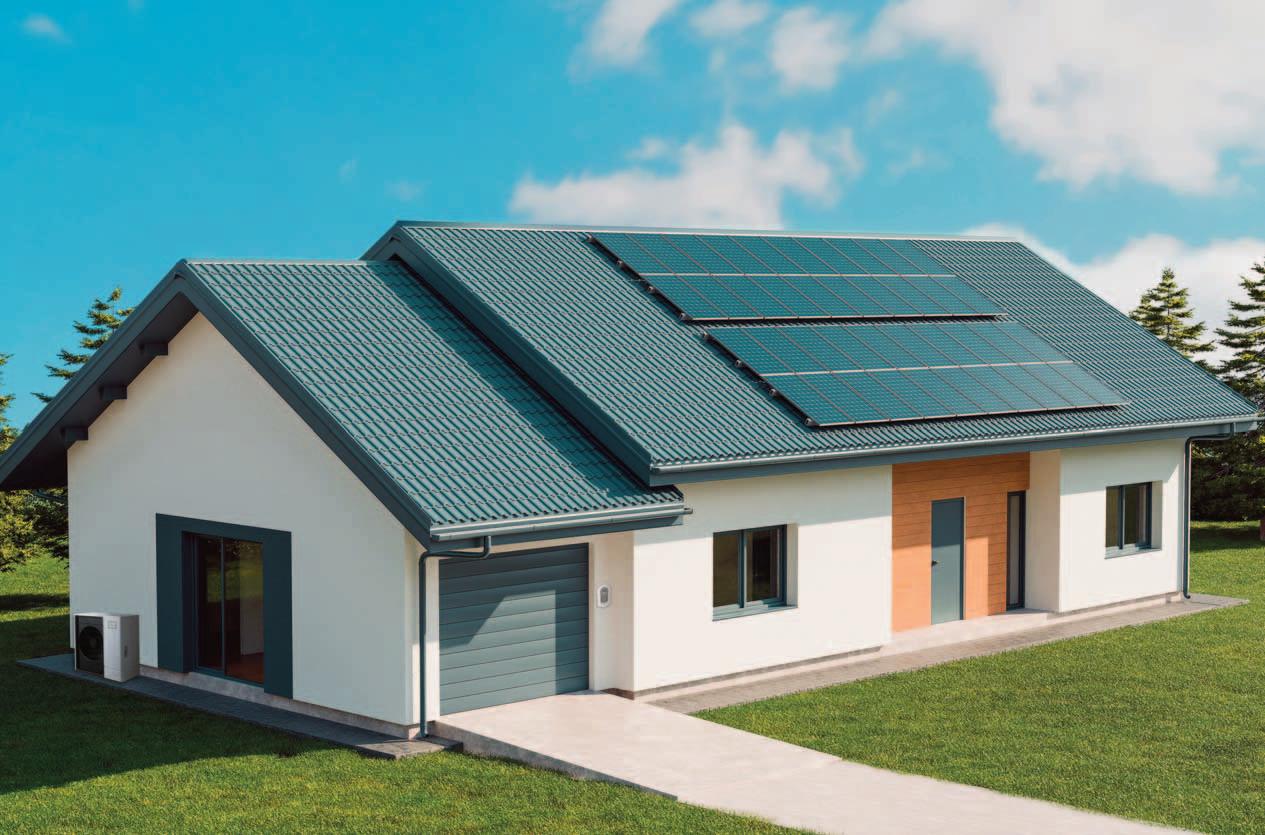
SSE Airtricity is working with governments, local authorities, and domestic customers to support the decarbonisation of homes across the island of Ireland.

Generation Green Home Upgrade
As a leading provider of cleaner, greener energy for homes and businesses across Ireland and Northern Ireland, we are all about making the island of Ireland a more sustainable place.
Stuart Hobbs is the Director of SSE Airtricity Energy Services (AES), a business dedicated to delivering home energy upgrades and utilising energy efficiency technologies to deliver a cleaner greener environment. SSE AES offers home energy upgrades under a number of different government-funded programmes: Northern Ireland Sustainable Energy Programme (NISEP), SEAI One Stop Shop retrofit programmes, Better Energy Homes, Local Authority Energy Efficiency Retrofit Programs (EERP), and SEAI Warmer Homes.
Up to two million homes across the island of Ireland are in need of energy upgrades by 2050, as energy efficient buildings are essential to meet our climate action targets. These upgrades typically include external wall insulation,
energy efficient windows and doors, attic insulation, heating controls, heat pumps, solar PV, and battery systems, and electric vehicle (EV) charging points.
Part of the Northern Ireland Assembly’s Climate Action Policy includes a national retrofit programme aiming to see up to 200,000 homes, retrofitted to a B plus EPC rating by 2030. SSE AES is supporting the retrofit of over 40,000 homes on the island of Ireland over the next 10 years, with around 4,000 upgrades already completed. These works will drastically reduce the emissions of thousands of homes, saving millions on energy costs for consumers and making their homes warmer, healthier. Once delivered, this will equal approximately £20 million in reduced energy costs every year.
A Generation Green Home Upgrade from SSE Airtricity is the perfect way to upgrade your home. Hobbs states: “We offer an award-winning retrofit service with a full range of home upgrade options, expert project management and a streamlined grant application process. We have partnered with Ireland’s leading experts in energy efficiency upgrades. From solar PV to windows and doors, internal and external insulation, heat pumps, and EV chargers, we only work with the best. Our customers receive a free home consultation to discuss their home upgrade requirements and receive expert recommendations from our team of specialists. It is one call, it is one job, it is one point of contact.”
SSE Airtricity has been providing home energy upgrades since 2012, working with SEAI, local authorities and other
housing bodies on joint initiatives. SSE AES help local authorities deliver their Energy Efficiency Retrofit Program (EERP) obligations by taking a lot of the hassle and complexity away, enabling them to deliver larger projects at a better cost and with more flexibility than their own resources might allow. “Over the last decade, we have delivered significant energy upgrades to fuel poor and social housing units, and we have significant ambitions to expand and increase these partnerships. SSE AES’s award-winning service provides a full EERP turnkey solution for local authorities, managing the works from start to finish on a partnership basis with local authorities or housing bodies. We offer pre- and post-BERs, full project design, guidance and preparation and management of all tender documents to be fully compliant with EU procurement requirements, including full end-to-end project management.” SSE AES also compiles all certificates and associated paperwork for the local authorities to make a successful claim to the department. In addition, SSE AES offers financial support to the project in the form of energy credits generated, as well as offering bridging finance for local authority EERP projects. SSE AES has a body of retrofit contractors and resources ready and able to deliver in all 26 counties in the Republic of Ireland.
Warmer Homes is a nationwide retrofit scheme administered by the SEAI delivering free energy upgrades for households in receipt of certain
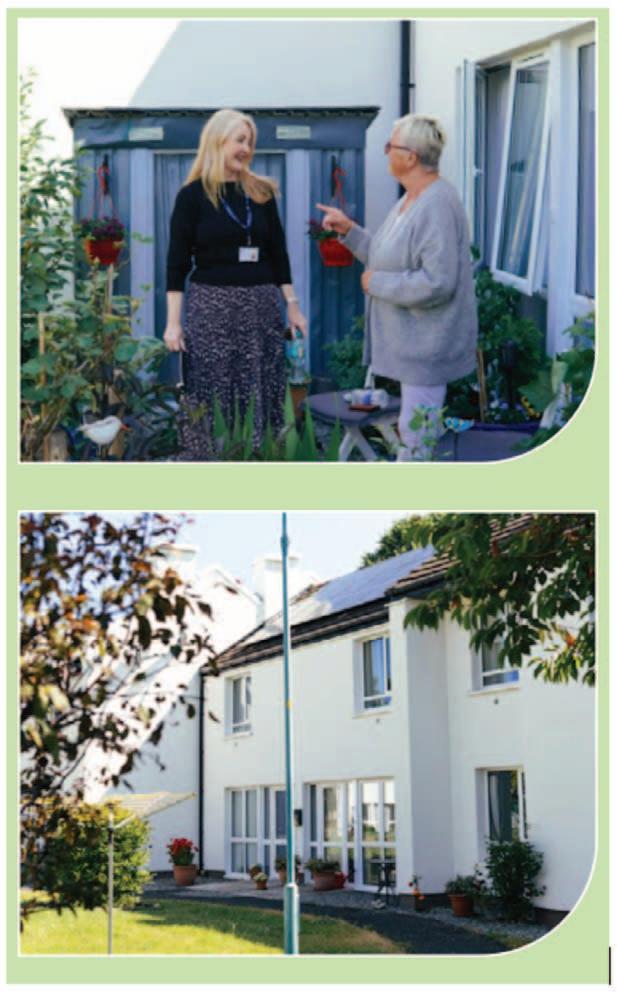


government benefits. Energy retrofit measures delivered under this scheme include high energy efficiency heating systems, ventilation, external wall insulation, attic insulation and in some cases windows and doors – making these homes warmer, healthier, and more economical to run. SSE AES is a registered SEAI Warmer Homes contractor to deliver energy upgrades under this national scheme. SSE AES has delivered over 270 home energy upgrades under this scheme since 2020 across a range of shallow and deep retrofit measures and have recently been successfully reappointed to the SEAI 2023 Warmer Homes Contract, to continue delivering energy retrofit upgrades on behalf of SEAI over the next four years.
SSE AES retrofit programs received awards and recognitions over the past few years for their various retrofit services. Last year alone SSE AES
received nominations and secured wins alongside their local authority partner, Dún Laoghaire-Rathdown, for their upgrade to 58 units in Beaufort OAP Complex in Glasthule. These included winning the Residential Energy Upgrades Awards category at the SEAI Energy Awards 2023, the Local Authority Innovation Award category at the Chambers Ireland Excellence in Local Government Awards, and achieving the gold award in the Energy Initiative/Project of the Year at the AllIreland Sustainability Awards.
For further information on SSE AES programme supports, contact Stuart Hobbs on: T: 00353 87 923 6404 E: stuart.hobbs@sse.com W: www.sseairtricity.com
SSE AES and Dún Laoghaire-Rathdown County Council receiving their SEAI Residential Energy Upgrade Award 2023 for the Beaufort Project. (L-R): Darrell Crowe (SSE AES), Stuart Hobbs (SSE AES), Willie Walsh (SEAI), Denis O’Callaghan, (Cathaoirleach, Dún Laoghaire-Rathdown County Council), James Ryan (DLR Co Co).The strategic housing authority for Northern Ireland

These statistics cover the 2022/2023 period unless noted otherwise and have been obtained from the Northern Ireland Statistics and Research Institute (NISRA) and the Irish Central Statistics Office (CSO).
Supply
Total housing stock 814,200
Average household size 2.5
Housing stock per 1,000 population 430
Occupied housing stock 762,000
Housing tenure 2022/2023





6,051 new dwelling starts in 2022/2023
• 18.6% decrease on 2021/2022
• 4,988 of dwelling starts in the private sector
• 1,063 in the social sector
Source: NISRA

Owned outright Ownedwithmorgage
Rentedprivately
Rented (NIHE)
Rented froma housingassociation
Rent free


New social housing dwelling starts 1,956 in 2022/23
46,461 applicants on the waiting list
34,651 in ‘housing stress’ (30 or more points on social housing selection scheme)
Average social rented sector rent per week £82
Sources: NISRA/DfC

Sources: NISRA and Irish Central Statistics Office The

15,965 households presented as homeless
• 8,388 households (52.5%) accepted as full duty applicants
• 2,742 (17.2%) rejected 10,349 households statutorily homeless
Families (37.1%) and single males (24.7%) groups with the highest proportion of homelessness acceptances
Source: NISRA

Average weekly private rent £109 in 2021/2022
• £46 below the UK average (£155)
• lower than England (£161), Scotland (£127) and Wales (£115)
• lower than Republic of Ireland (€273/£234)
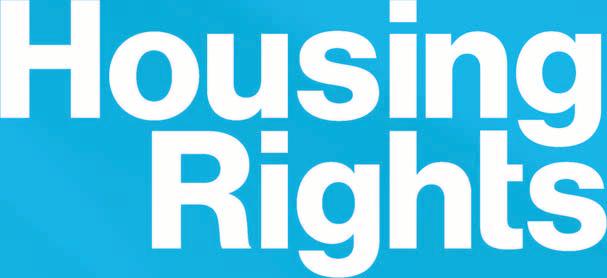


With 60 years’ experience, Housing Rights can conclusively say that high quality, independent housing advice changes lives, writes CEO, Kate McCauley.

As the leading provider of housing advice in Northern Ireland, our advisers change lives every day. Last year, amid a cost-ofliving crisis, our advice services helped
13,517 households and we directly prevented 1,398 households becoming homeless.
First established in 1964, in response to the appalling housing difficulties linked with widespread slum clearance in Belfast, our founders understood the urgency in addressing the immediate hardship many in the city faced.
Six decades later, we work throughout Northern Ireland within communities and across sectors with our services extending from advice, advocacy, and representation to policy and capacity building. Whilst our work has grown and the backdrop has changed significantly, many people still have difficulty finding and keeping a home that meets their needs.
Poverty remains inextricably linked with homelessness. Housing conditions, while dramatically improved overall, still have a debilitating impact on health and wellbeing for people on the lowest incomes. Legal and policy protections can and should go further.
The communities we serve, face real and pressing challenges
The experience of the pandemic and the economic shock which followed have not been felt evenly across society. Recent research by the Institute for Fiscal Studies shows that housing costs take up three-and-a-half times as much of the budgets of low-income households, compared to those on a high-income with significant implications for living standards.
The stubborn challenge of poverty is now matched by a profound crisis in housing supply. Over the last 20 years, there has been a 72 per cent increase in the number of people in need of social housing. In the same period, the number of homes allocated to those on the housing waiting list, has fallen by one
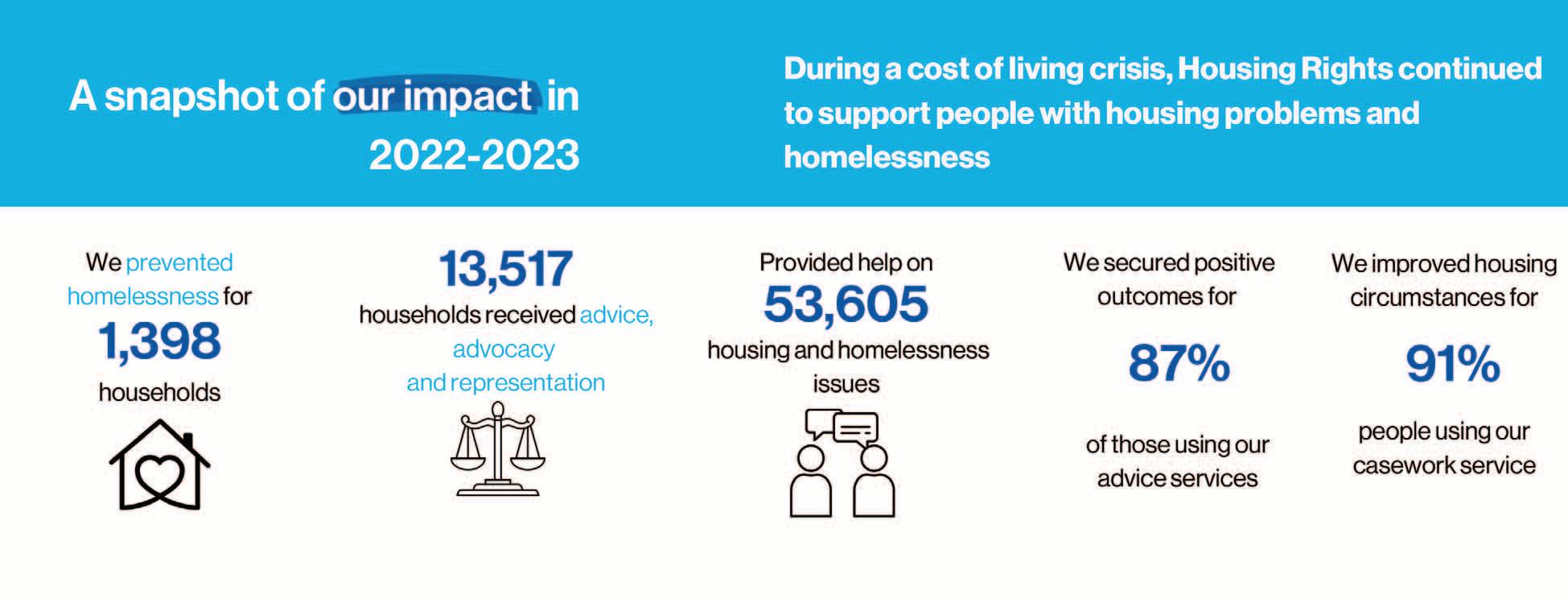
third. Last year, there were more temporary accommodation placements than at any time since records began. New threats, posed by the impact of climate change, risk deepening long standing inequalities in housing. Extreme weather events, including flooding are increasing and we want to ensure that the needs of those most in need of our services are not left behind in the ‘race to net zero’. This provides a new lens for our focus on affordability and poor housing standards. In an updated report (February 2024), the Institute for Health Equity (IHE) has noted that despite improvements in housing insulation since 2011, just over half of all households in the UK are living in energy inefficient housing. This, the IHE states, together with excessive costs of fuel and increasing poverty, means that more of the population are at risk from the poor health and mortality associated with cold homes than when their first report was published more than a decade ago.
We recognise the challenges ahead, but we are encouraged by our track record in effecting positive change. As an independent charity with strong links across the community and voluntary sectors, we see the value in and results of effective collaboration. We are proud of our work with others, and we have proven ourselves to be an important delivery partner for government.
We are values led and solution focused. We know that we must continue to be agile and innovate, so we can best meet the needs of the communities we serve. Going forward, we will shape inclusive,
“The stubborn challenge of poverty is now matched by a profound crisis in housing supply.”
prevention focused services by working with and through communities. We intend to build on our track record of involving people affected by poor housing and homelessness. For a long time, we have involved ‘experts by experience’ in the delivery of our services, such as our peer advice work in Northern Ireland’s three prisons.
This experience has taught us that the services we deliver are better when they are designed in partnership with the people who use them. Our new strategy, which itself was informed by the insights from people affected by poor housing and homelessness, commits to increasing our work in this area.
Developments in technology and insights from data will help us make the best use of limited resources. We are already using these advancements to make it easier for people who need our help to access it. Our online advice and information content has been completely rewritten and we provide advice across multiple channels. This year, we are excited about our partnership with Altair, who we have commissioned to help us make better use of the data we hold. We want our services to be more responsive and evidence informed, and we know that timely and accessible data is a key enabler for this. Strategically, we also
know that data about the level and nature of need for our services is also a key indicator about how well government housing policy is working. We consistently ensure that our contribution to public policy development is informed by the experience of the people we serve, and we are working hard to strengthen this evidence base further.
As we look forwards, we feel the same urgency and commitment as our founders did to ensuring everyone has a home. We remain steadfast in our determination to provide quality services which prevent homelessness and help people with their housing problems.
T: 028 9024 5640
W: www.housingrights.org.uk
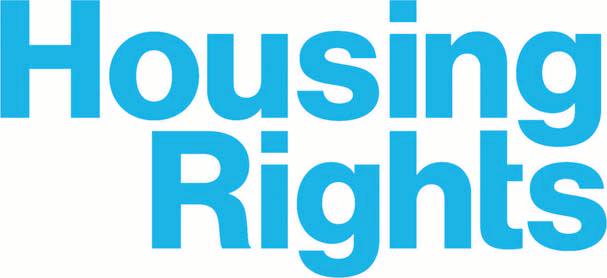

While changes made to regulations around houses in multiple occupation (HMO) have been met with broad satisfaction from houseowners and tenants alike, a Department for Communities review on HMO legislation outlines seven proposed changes which also have a considerable level of support.
The Houses in Multiple Occupation Act (Northern Ireland) 2016, which came into effect in April 2019, transferred the responsibility for the regulation of HMOs from the Housing Executive to local councils, while also changing the scheme from a registration scheme to a licensing scheme.
A challenge raised by the Department is that many HMO occupiers are “unaware of their rights, or have few housing choices, and are therefore vulnerable to exploitation”.
The main objective of the review, entitled Review of Houses in Multiple Occupation Scheme and published by the Department for Communities in July 2023, was to examine how the scheme is working on delivering the original policy intent to “improve the conditions for tenants in this type of accommodation”.
Although the report states that there is broad satisfaction for the 2016 legislation from tenants and houseowners alike, the review raises seven prospective legislative changes to the Houses in Multiple Occupation Act (Northern Ireland) 2016 raised:
1. The first of these was amending section six of the Multiple Occupation Act (Northern Ireland) 2016, which pertains to notice regarding continuation of occupation. Belfast City Council’s NI Houses in Multiple Occupation (NIHMO) unit has requested that the time limit of four months in section 6 is extended to six months as with some properties which are let to students, the property may be empty from May to October. The Department states it will “consider a change to this section”.
2. The second proposed change is to section 12 of the Act, which pertains to overprovision. Currently, section 12 states that in considering whether granting a licence would result in overprovision of HMOs in an area, the Council must have regard to: (a) the number and capacity of licensed HMOs in the locality, and (b) the need for housing accommodation in the locality and the extent to which HMO accommodation is required to meet that need. The Department, however, states that “historical overprovision is outside of the scope of the Act and therefore of the review”.
3. The third proposed change is to sections 15 and 16, which are on temporary exemption notice and extension of temporary exemption notice, respectively. Currently, section 15 of the 2016 Act applies where the owner of an unlicensed HMO makes an application to the Council which specifies steps which may be taken with a view to securing that the HMO ceases to become a HMO and includes a declaration that the owner intends to take those steps. This provision allows landlords to give tenants notice to leave the property. A temporary exemption notice has an effect for three months.
Additionally, section 16 allows the exemption notice to be extended for a further three months. Belfast City Council has requested the ability to charge a fee for such notices, which is currently a free service, and that charging be allowed under this provision to bring it into line with the other notices under the scheme for which there is a charge to cover the administrative costs associated with issuing such notices. The Department for
Communities has agreed to “work with councils to determine the appropriate fee” and to propose changes to the legislation “to allow such a fee to be charged”.
4. The fourth change proposed in the review is to section 29, which is on the death of a sole licence holder. Section 29 states that when a sole licensee dies, an existing HMO licence is to be treated as being held from the date of death by the licensee’s personal representatives. Section 29 transfers the licence of a deceased sole licence-holder to that person’s executor. The licence expires three months after the date of death, unless the council is satisfied that it is reasonable to extend it in order to wind up the holder’s estate. The Department proposes that this time limit is extended to 12 months.
5. The fifth change proposed is to schedule two, paragraph three, which currently states that a council “must send a copy of any application for an HMO licence to the statutory authorities”. The Department recommends the removal of the requirement for statutory agencies to be notified of all HMO applications. However, the Department states that under current legislation, the police, fire service, NIHE and the Department all get notified of applications and it is not required.
6. The sixth proposed in the review is to schedule two, paragraph 12, which sets out a time limit of three months for a council to process a HMO licence application. The NIHMO unit has reported difficulties with the current three-month limit which it states has been “exacerbated by the Covid-19 pandemic and the changes to ways of working this has entailed”. The NIHMO unit also claims that the requirement for an extension to the time limit to be made through a court is incurring significant expenditure, with the court service also querying the number of applications received in this regard. The Department proposes extending this time limit.
7. The seventh and final proposed change is to the Houses in Multiple Occupation Regulation (Fees), which currently stipulates that the maximum fee that can be charged to process a licence application is £45. The Department acknowledges that this upper limit “will have to be reviewed” to ensure that the income generated by the licensing scheme “continues to meet the costs of the scheme”.
The Department for Communities states that these proposed changes mainly involve amending the primary legislation, and therefore will “take some time to complete”.
out the roadmap for providing homes and services for an
As one of Northern Ireland’s largest housing associations, Clanmil provides homes for people to live well at all ages and stages of life, including a range of accommodation options for over 2,800 older people with varying levels of independence and support needs.
We are living in an ageing population, with one in six people in Northern
Ireland now aged 65 or over. That figure is predicted to increase substantially in the next 25 years, and we need to be ready to meet the challenges that lie ahead.
As well as more demand for specialist housing, there will also be more pressure on support services and social and healthcare provision.
• Clanmil Housing is one of Northern Ireland’s leading housing associations and currently owns and manages over 5,800 homes throughout Northern Ireland including family homes, homes for single people, and homes for older people.
• Clanmil provides a range of accommodation and support for 1,800 older people including category 1 apartments for active older people, independent living schemes, housing with care for frail older people and supported housing for older people with dementia. A further 1,000 older people live in general needs accommodation.

Our focus is to ensure that older people can live independently for as long as possible. In addition, we want them to be comfortable and safe within their communities and most importantly, to feel they are valued, and their voices are heard.
To navigate the challenges ahead, we launched a new three-year Older People Strategy in December 2023. The strategy was co-designed with customers and colleagues, as part of our commitment to focus our efforts on areas that really matter.
With six strategic goals outlining our vision, the strategy describes our commitment to providing high quality homes for older people to live well, now and in the future, and delivering the right services for customers, including through effective partnerships where appropriate. We will also continue to advocate for older people and ensure that their voices are heard as well as supporting them to live fulfilling lives, with dignity and choice.
Commenting on the new strategy, Pól Callaghan, Director of Housing, Customer and Communities at Clanmil says: “People are now living for longer and their expectations are changing. At Clanmil we recognise that our services need to be flexible and adapt.
“Our new strategy will ensure that we are focusing our efforts where they have most impact and that we are providing the types of homes and services people need, so that they get the most from life as they grow older.”
To find out more about Clanmil, visit www.clanmil.org.uk

One of the issues that informed Clanmil’s Older People Strategy is loneliness. It has become a significant challenge, with 30 per cent of people in society over 80 describing themselves as feeling lonely.*
To combat this, we work with a range of

partners to deliver programmes and activities that increase wellbeing and encourage socialising.
One of these partners is Linking Generations, who have been connecting people of all ages in communities across Northern Ireland since 2009. They
have provided training sessions for Clanmil colleagues on making links between residents of independent living schemes and schools and nurseries in their communities.
In Ballymoney, a group of year 6 pupils at a local primary school have been visiting residents of Cramsie Court, an independent living scheme in the town. Each Friday afternoon, the young people from Ballymoney Model Integrated Primary School visit the scheme to learn how to play traditional board games and crafts like knitting, while chatting over juice and biscuits and getting to know each other.
Kathy Murphy, who lives at Cramsie Court, said she really enjoys the weekly visits: “It is very good for the children and for us residents. It is good for us to mix and to show the children our skills, like knitting and playing games. I have been teaching one of the wee girls knitting and she is getting on very well.”
* Taylor and Neill and Field

Staying active through physical activity is just one of the ways to enjoy a happy, healthy old age. When former boxing champion and coach Joe Harvey recently brought his boxing classes to De La Cour House in Belfast, the residents discovered a new lease of life.

The class proved hugely popular with residents, some of whom are over the age of 80 and many living with conditions such as dementia. As well as helping build up strength and fitness with the use of boxing gloves, pads and resistance bands, the class also saw

some of the quieter residents become more confident and sociable.
The success of the initiative led Clanmil to roll out the classes to two more care homes; Giboney House in Belfast and Marriott House in Magherafelt. Residents at one of Clanmil’s independent living schemes, Cook Court in Newtownards, have also enjoyed classes with Joe.
As well as helping to improve their strength and endurance, the classes have encouraged residents to socialise with others, which is important in combatting loneliness and isolation. Staff at the care homes also reported that residents were mentally more alert and their sleeping and eating patterns improved after the classes.
Boxing Fit at Clanmil: Pictured from (L-R): De la Cour Manager Tammy Forsythe; resident Sammy Johnston; boxing coach Joe Harvey. Annie Pollock, a year 6 pupil at Ballymoney Model Integrated Primary School with Kathy Murphy, one of the residents at Cramsie Court‘Right to buy’ scheme to remain



New Housing Minister Gordon Lyons MLA has said that he has no intention to bring forward legislation to end the Housing Executive’s House Sales Scheme.
The Minister was responding to a question posed by the SDLP’s communities spokesperson Daniel McCrossan MLA, whose party is calling for the scheme to be scrapped in a bid to reduce the number of households on the growing social housing waiting list.
The Housing Executive’s House Sale Scheme was first introduced in 1979 and has seen over 120,000 properties sold to tenants at a discount.
As Northern Ireland’s largest social landlord, the Housing Executive currently maintains a stock of over 80,000 homes but that number has been falling, in part due to the House Sales Scheme.
While the number of house sales under the scheme varies per year, it is understood that on average the number of homes sold by the Housing Executive per year is in the hundreds.
Under the scheme, eligible tenants of the Housing Executive have a right to buy their home at a discount. A five-year secure tenancy usually brings a discount of some 20 per cent of market value, but discounts can increase by 2 per cent for every additional tenancy year to a maximum of 60 per cent or £24,000, whichever is lower.
The scheme, which previously applied to all social landlords, was closed to tenants of registered housing associations in Northern Ireland in August 2022 following the passing of the Housing (Amendment) Act (NI) 2020.
The legislation was passed in recognition that social landlords were losing stock at a time when the social housing waiting list and volume of households deemed as in housing stress were increasing. At the end of 2023, 46,461 households were on the housing waiting list, 34,651 of whom were deemed as in housing stress.

The waiting list challenge has seen a renewed push for an increase in supply of new social homes. The Department for Communities’ draft Housing Supply Strategy estimates the need for an average of 2,222 new social housing units per year by 2027 to address need. However, despite this, financial pressures have seen a reduction in the number of social homes (1,500) delivered this year, compared to last (1,956).
Previous housing ministers have indicated an intention to potentially close the scheme in recognition that the need to increase to supply is in contrast to the loss of social housing stock to the private sector.
Housing officials have highlighted that the cost to build a new social home is significantly more than the money received from social unit sales. In addition, those social housing units sold tend to be of the best quality, meaning a deterioration the average overall condition of the remaining social housing stock.
Any loss of stock equates to a loss of rental income, further restricting the finances available to the Housing Executive to maintain its existing stock.
Following the passing of legislation to end the House Sales Scheme for housing associations, in November 2020, then-interim Housing Minister Carál Ní Chuilín MLA announced her intention to bring forward a consultation on the Housing Executive’s House Sales Scheme and make changes before the end of the electoral mandate, with the aim of addressing “the need to protect social housing stock and deal with the inequity in the social housing”.
“The selling of our social housing stock has been a huge contributory factor to our spiralling housing waiting lists”.
However, following the restoration of the Northern Ireland Executive in February 2024, new Housing Minister Gordon Lyons MLA has now stated that he has “no plans” to bring forward legislation to end the Northern Ireland Housing Executive’s House Sales Scheme.
This is despite recognition from a senior official in his department that the decline in the number of Housing Executive-owned home is potentially unsustainable.
Mark O’Donnell, Deputy Secretary of Housing and Sustainability at the Department for Communities, told the Northern Ireland Assembly’s Communities committee that: “There is no doubt that the number of Housing Executive homes is declining at a fairly, maybe unsustainable, rate because of the ‘right to buy’ scheme.”
O’Donnell said that while he knew the abolishment of the scheme had been on the agenda for other ministers in the past, he was not in a position to pre-judge the current minister’s outlook.
Speaking after receiving written confirmation from the Minister that he did not intend to legislate, the SDLP’s McCrossan highlighted that his party has long called for the scheme to be scrapped in recognition that “the selling of our social housing stock has been a huge contributory factor to our spiralling housing waiting lists”.
McCrossan added: “When the Assembly returned, I asked the new Communities Minister Gordon Lyons to give his view on the policy only to be told he has no intention of ending it. This seems particularly short-sighted given the failure to accelerate housebuilding in the North over recent years, with the cost of materials spiralling, all while social housing stock is being sold off.
“I would urge the Minister to look again at this proposal and the SDLP opposition will continue to push for the end of this practice that has undoubtedly contributed to our housing crisis.
“We will never address these issues without taking tough decisions and the Minister needs to act now before things get even worse.”
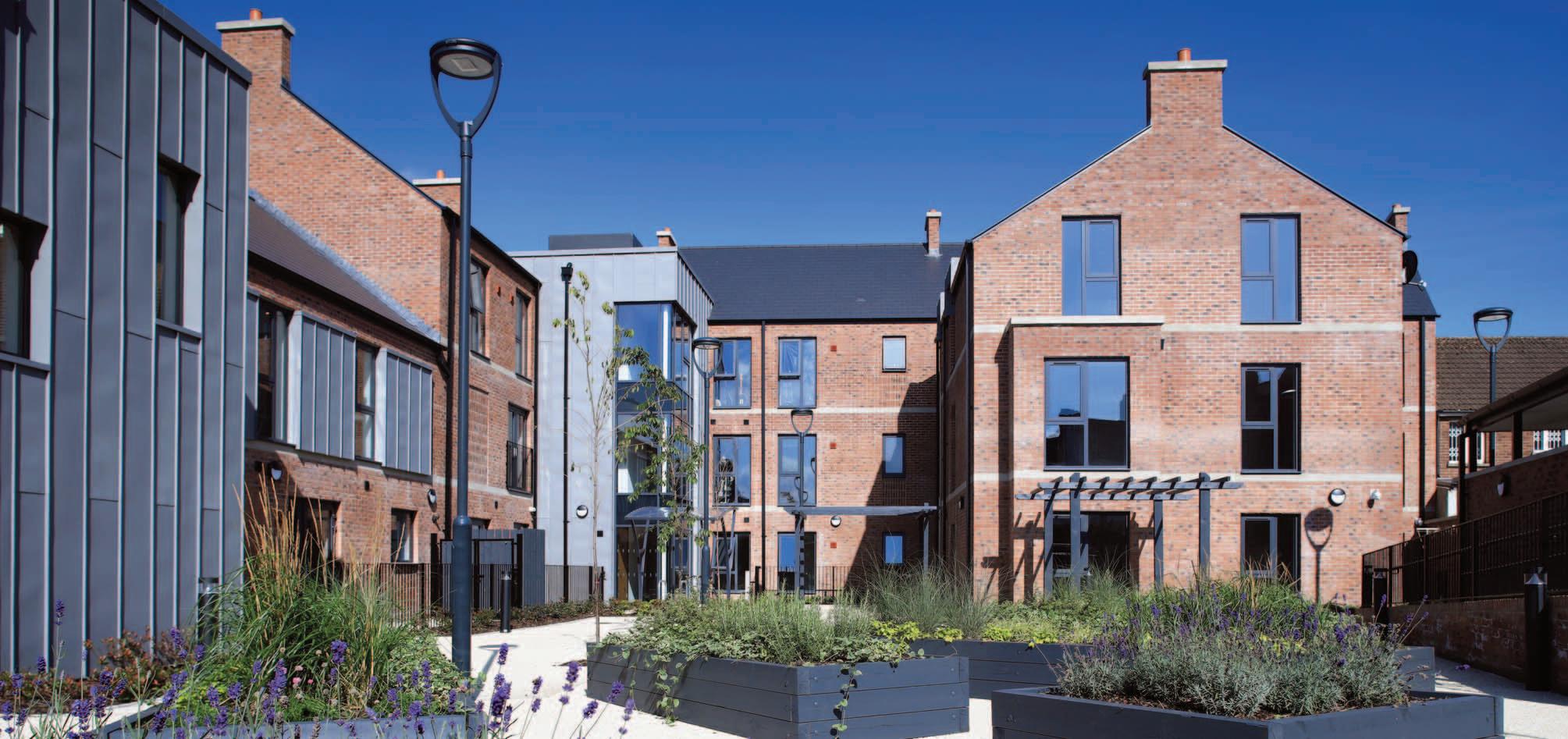
Michael McDonnell, Choice Group Chief Executive, outlines the housing association’s new roadmap for effective and efficient services.
A clearly defined ‘roadmap’ is important to ensure the smooth and successful operation of any organisation and Choice Group is no different. On 1 April, Choice launched our Strategy to 2027, a document that will feed directly into the day-to-day activities that take place at one of Northern Ireland’s largest housing associations and social enterprises.
It will also provide clear direction in terms of decision-making, and the creation and implementation of new policies over the next three years.
Reflecting the views of our stakeholders,
including trustees, tenants, staff, partners, and others across the Northern Ireland housing sector, we believe that we have a bold vision for the future.
Choice Group has listened carefully over recent months and we have identified three strategic priorities which create a framework for our activities from now until 2027.
There are many opportunities for our tenant-centred, community-focused, notfor-profit organisation to change and improve the way that we do things. Ultimately, Choice seeks to make a positive difference to our stakeholders
through effective and efficient services and a focus on maximising our resources to keep our rents as low as possible. We will also continue to access development funding at competitive rates to enable our growth aspirations.
Our first priority is to Provide Great Homes. In the case of new homes, we intend to contribute significantly to the Social Housing Development Programme with a clear focus on high-demand, general needs housing. All Choice homes should be safe, affordable and of a high quality. We will continue to lead the sector with our mixed-tenure strategy
using the skills and expertise of our Maple and May subsidiaries to ensure we create communities that are free from stigma and segregation. We will also champion the ‘Housing for All’ initiative which promotes diverse, integrated, and sustainable neighbourhoods.
Supporting Communities to Thrive is our second strategic imperative and this should underpin every Choice scheme across Northern Ireland. Listening to our tenants, taking their views on board and reflecting their feedback in our service delivery is fundamental to our charitable status. Tenancy sustainment is crucial, too, and we will achieve this through the provision of excellent housing and property management services, including best in class maintenance response times through our subsidiary Choice Services.
Other objectives include working through mutually beneficial partnerships to meet sheltered and supported housing priorities and informing and influencing public policy and debate around the issues that affect tenants and communities.
As a large employer across Northern Ireland, we are committed to Empowering our People by investing in their skills and wellbeing. This strategic priority reflects the fundamental importance of our people and the need to develop talent in a competitive labour market. We will also make better use of our systems, data, and reporting to improve the decision-making process. Enabling technology to simplify both the staff and customer journey will promote both high satisfaction with our service delivery and enhanced value for money.
Whilst Strategy to 2027 sets a new and exciting direction forward for Choice Group, our mission is unchanged as we seek to enrich the lives of our tenants and communities through the provision of great homes and services.
Our vision is to excel in everything we do in the eyes of our customers, partners and staff. Our ultimate ambition is to empower staff and partners to make a positive and sustainable difference by: increasing the supply of high quality and affordable homes; ensuring access to excellent support services; enabling our communities to flourish; and making best use of our collective talent and resources.

Underpinning everything are the Choice values which remain unchanged. We will be caring through listening, being helpful and always act professionally. We will be committed through our determination, being a reliable housing provider and always acting with integrity. And we will be creative through innovating, being responsive and always seeking to improve.
But Choice should always be judged by what we do rather than what we say. So, we will continue to develop challenging annual business plans and budgets with specific deliverables and robust key performance indicators and targets. Progress will be monitored with group board, subsidiary boards and committee members and we are going to report regularly to stakeholders on our achievements, future intentions and investment plans. We will also deliver annual reports on our performance to the Department for Communities and
Charities Commission who act as our regulators.
These are challenging times for the Northern Ireland housing sector with lots of risks to manage and obstacles to overcome. However, the recommencement of the Northern Assembly provides a basis for optimism and renewed hope that housing will feature prominently in the new Programme for Government.
Whatever the context, Choice Group through our new strategy will continue to focus on supporting our tenants, their families, and communities across the region.
T: 0300 111 2211
E: enquiries@choice-housing.org
W: www.choice-housing.org

Radius Housing recently hosted some of the UK and Europe’s leading housing associations and stakeholders to share best practices on the delivery of affordable and sustainable homes.
In November 2023, Radius and Belfast hosted the Autumn Conference for the European Federation of Living (EFL). The EFL is a consortium of European and the UK’s leading housing associations, universities and expert private businesses which specialise in all matters social housing. Members include Places for People, Clarion, the Peabody Group, the Wheatley Group and Cluid.
Whereas other European housing bodies focus on policy and research, the EFL seeks to share best housing practice and to create practical solutions to create more affordable, sustainable housing.
It comprises 70 members and associates from 19 European countries, with a joint portfolio of more than 1.3 million homes across Europe. The EFL combines the shared knowledge of member social housing providers with the cutting-edge thinking of leading associate partner universities, and the innovative work of private sector companies. Through events, research, and projects, EFL ensures that members and associates are at the forefront of innovating property and community development in Europe. Radius joined the EFL with the intention of collaborating on projects and
knowledge sharing across a broad range of topics including: ESG and sustainability; modern methods of construction; community investment; capital financing options; technology in housing; older people housing and services, to name a few.
The EFL regularly hosts workshops for topic groups as well as development programmes for young managers. A number of Radius managers have had the opportunity to network and participate in these programmes and benefit from the unique opportunity of collaborative thinking and problemsolving with peers from different
countries and backgrounds. This experience has helped widen their perspectives and expand their personal networks such that they are better able to tackle the challenges and opportunities that lie ahead.
EFL members were keen to come to Belfast and not only sample the hospitality of the city but also understand how the region was regenerating sustainable communities, providing for its older citizens, maximising independence through technology and exploring the potential for AI.
In recent years, Radius adopted the UK’s Sustainability Reporting Standard (SRS) as a means of aligning an extensive list of community investment, governance, and eco-friendly initiatives and commitments.
In 2023, Radius further added the Sustainable Finance Framework approach as it became the first Northern Ireland business to draw down a £20 million Green Term Loan with Barclays Plc. This will help fund new developments designed to EPC-Level A sustainable homes. We were proud to win the Belfast Telegraph’s ‘Climate Initiative of the Year’ award in 2023 with the judges citing our “strategic and holistic approach” and further stating “Radius has delivered a range of initiatives to decarbonise both their existing properties and their newbuild developments as well as a number of other environmental improvements”.
At the event, the Radius community investment team were able to showcase their outcomes as they have been particularly active in all matters societal, promoting initiatives to improve tenancy sustainability; inclusivity, awareness and respect; wellbeing, education and employment; together with intergenerational biodiversity. Advice officers over three years have identified over £2.5 million of entitlements which have had life-changing consequences for many.
Tenants across Northern Ireland engage with Radius through a network of committees, focus groups and community-based events. Last year, over 10,000 participants joined 260 community events, programmes, and projects, jointly arranged with 110 statutory and community partners.
Radius’s much heralded Schools

Biodiversity Project was one of several highlights in the year with 23 schools and 607 pupils coming together under the ‘Keep Northern Ireland Beautiful’ initiative, aimed at promoting good relations and inclusivity within the theme of better biodiversity. Older people took part in the programme adding an intergenerational dimension to proceedings. Radius is one of many local associations promoting shared living through the Housing Executive’s Housing for All programme covering new-build communities. No less than 14 Radius neighbourhoods have signed up to the government-backed initiative, each with detailed good relations plans, aimed at building respect and understanding and celebrating diversity.
In 2023, Radius commenced work on 94 new energy efficient homes on the former Gasworks Site in the Market area of Belfast. EFL members listened with keen interest to Fionntán Hargey of the Market Development Association (MDA) as he described the process of community engagement and the pivotal role the new development will play in the wider regeneration of the historical area of the city. Members would later participate in a discussion on the Belfast Local Development Plan and the ’15-minute-city’ urban concept whereby most daily necessities and services, such as living, work, shopping, education, healthcare, and leisure can be easily reached by a 15-minute walk, bike ride, or public transit ride from any point in the city.
Environmental Architect Sofie Pelsmakers gave her perspective on senior living while Marcel Staub of Lookthrough explored the potential for AI in a housing context. The conference attendees visited the Titanic Quarter and toured residential neighbourhoods across Belfast. They were captivated by the remarkable stories that contributed to Belfast’s complex history. They were welcomed to the Belfast City Hall by Lord Mayor Ryan Murphy, followed by dinner that evening in the Great Hall of Queen’s University, hosted by Kellie Armstrong MLA. Further presentations on housing IT, ESG, energy poverty, and assistive technology made for a memorable conference.
The Radius Housing team were delighted to be recognised at the Social Enterprise NI awards, as Social Enterprise of the Year 2023. This was in recognition of their "exceptional social impact and ongoing work with communities and partners, locally, nationally and across Europe".
Their commitment to ESG and to building resilience across their shared communities is helping to sustain tenancies and improve the prospects for citizens across Northern Ireland.
Contact: www.radiushousing.org





